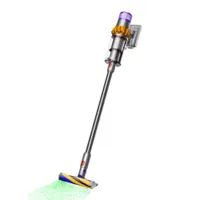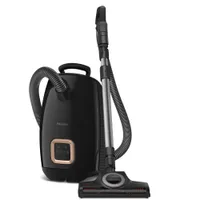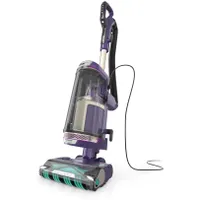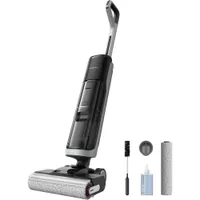The Best Vacuums for Your Home in 2026 – I Test Vacuums For a Living, and This Is the Ultimate Guide to Choose the Right One
We'll help you pick the best vacuum for your floor type, cleaning needs, storage space, budget, and more, all backed by rigorous, real-world testing of 90 vacuums

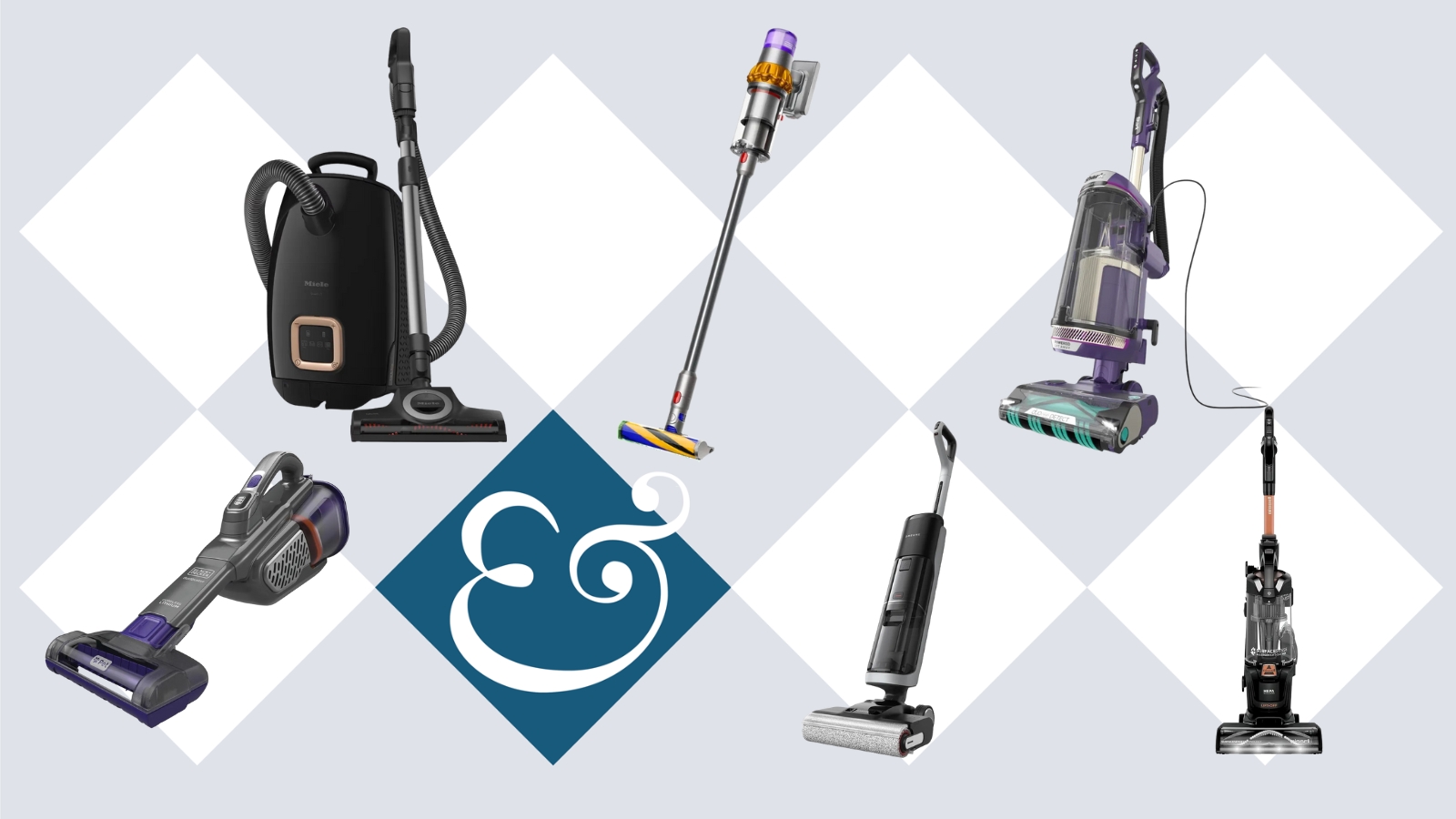
Design expertise in your inbox – from inspiring decorating ideas and beautiful celebrity homes to practical gardening advice and shopping round-ups.
You are now subscribed
Your newsletter sign-up was successful
Want to add more newsletters?

Twice a week
Homes&Gardens
The ultimate interior design resource from the world's leading experts - discover inspiring decorating ideas, color scheming know-how, garden inspiration and shopping expertise.

Once a week
In The Loop from Next In Design
Members of the Next in Design Circle will receive In the Loop, our weekly email filled with trade news, names to know and spotlight moments. Together we’re building a brighter design future.

Twice a week
Cucina
Whether you’re passionate about hosting exquisite dinners, experimenting with culinary trends, or perfecting your kitchen's design with timeless elegance and innovative functionality, this newsletter is here to inspire
7 January 2026: I've updated the top picks for the best vacuum-mop combos and the best robot vacuums, and have expanded the how to choose, vacuum types and vacuum brands sections, including a new brand comparison table.
The perfect vacuum doesn't exist, but the best vacuum for your home does. Whilst there is no one-size-fits-all recommendation, understanding your household's floorcare needs will help you choose the vacuum that will clean the best, with the least effort, at the lowest price, and be able to be stored away in the space you have available.
I've spent more than 300 hours testing vacuums, and my testing team and I have rigorously reviewed 90 of the world's best vacuum cleaners (and counting), including upright, cordless, canister, pet hair vacuums, and even the best robot vacuums to see which are truly worth the spend, and which are not.
This guide will help you understand your floor care needs and what the best vacuums you can afford in your price range can offer in terms of features and performance. And, after surveying dozens of householders with real-world vacuuming pain points, I know precisely how to help you narrow down the right appliance for your space. I've also visited Dyson's labs, speak regularly to industry experts, and test these appliances in a variety of locations and across different floor types and mess levels to determine real-world results for every model.
If you already know which type you're after, I've created a quick list of the top six that stand tall after our testing sessions. For those who need a little more guidance, jump down the page first to find out how to choose a vacuum cleaner, browse my shortlist of the best vacuums by type and the best vacuums by flooring, or compare vacuum brands.
President's Day Deals
While the President's Day sales are live, I'm collating the best deals on our favorite vacuums. Keep scrolling for the full guide.
Dyson V15 Detect | was $849.99, now $649.99 at Dyson (save $200)
With unrivalled suction power on every surface, amazing pet hair pickup, and a lightweight build that makes it easy to grab and go, this is the best cordless vacuum we've tested. This $200-off deal at Best Buy includes every attachment available, including a motorized hair tool.
Miele Guard L1 Cat & Dog | was $899.99, now $597.99 at Walmart (save $302)
Somehow, Walmart is selling the best-performing vacuum we've ever tested for $302 less than you'll find from Miele.
Shark POWERDETECT | was $599.99, now $399.99 at SharkNinja (save $200)
For bigger, messy homes thanks to its relentless suction, large dustbin, and long power cord, this is one of the most powerful vacuums we've tested, and is now reduced by $250.
Dreame H14 Pro | was $699.99, now $429.99 at Dreame (save $270)
Combining vacuuming and mopping, the ultra-efficient Dreame H14 Pro is almost half price, and it's the best vacuum-mop we've tested.
The Best Vacuum Cleaners, At a Glance
I'll make this easy:
The best on-test vacuums are the Dyson V15 Detect, the Miele Guard L1 Cat & Dog [at Walmart], and the Shark POWERDETECT Upright. These incredibly sophisticated vacuums clean flawlessly on the first pass, boasting some of the highest suction power on the market.
They're also my top vacuums for households with animals, as well as the best cordless, best canister, and best upright vacuums, respectively. If they're within your budget, look no further.
The best vacuum-mop combo is the Dreame H14 Pro. I use it at home, and it's cut my floor cleaning time in half, cleaning up solids and wet spills at once.
The best handheld vacuum is the Black+Decker dustbuster furbuster AdvanceClean+ Pet [at Amazon], perfect for small tasks, quick cleans, and cars, and to help avoid dust and hair from building up around the house.
The best budget vacuum is the Bissell SurfaceSense Allergen Pet Lift-Off. It's a powerful upright that adapts suction to your floors, while costing $100-200 less than premium alternatives.
Feel free to use the navigation links below to dive further into the details. Or, if you want to compare the ultimate top six, here they are in a little more detail:
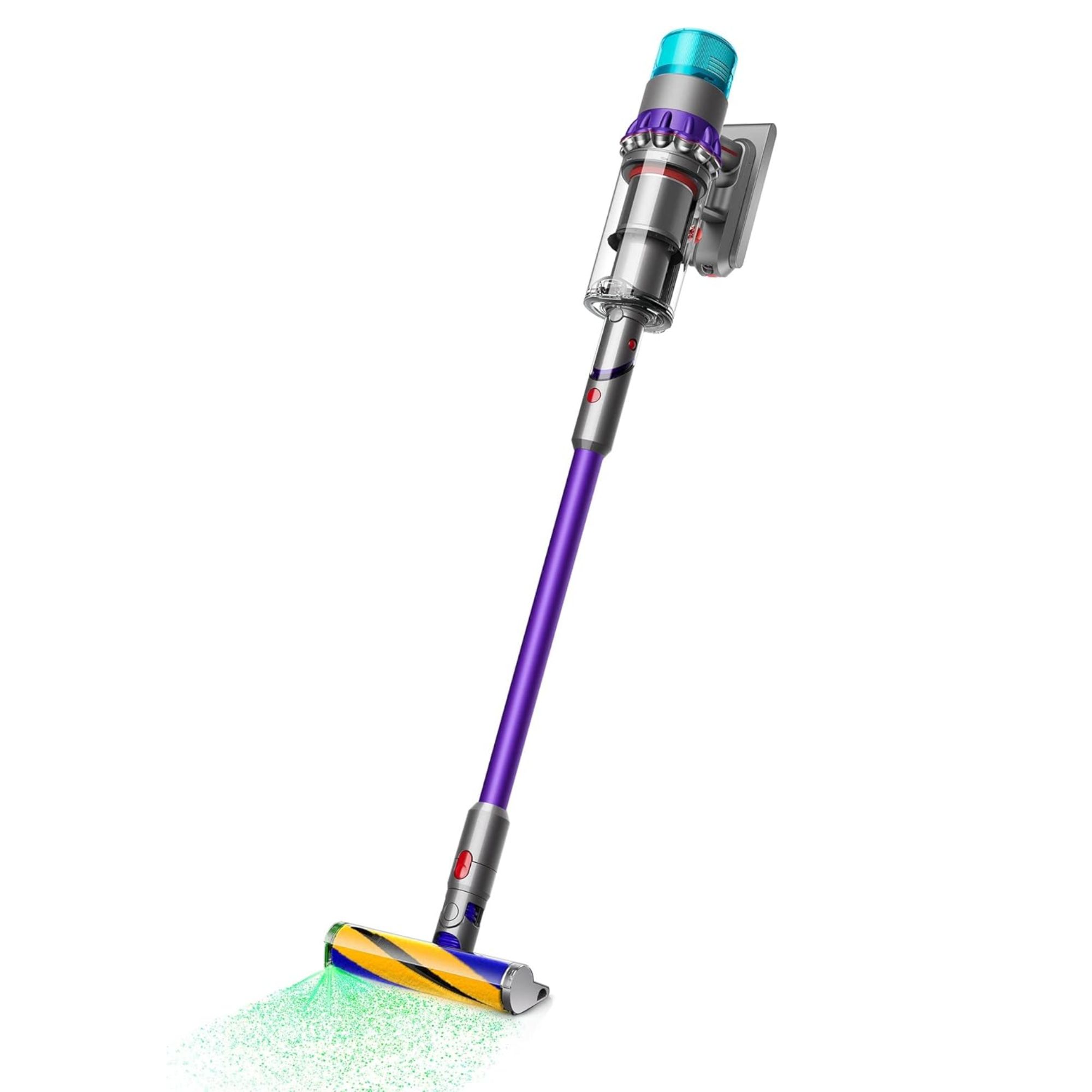
The best cordless vacuum for lightweight, easy cleaning
One of the only cordless sticks worldwide that can match the cleaning power of a big, corded vacuum, the Dyson V15 Detect is an impressive feat of engineering. It will pick up all types of debris and hair in a single pass while revealing dust that the naked eye can't see. It's expensive, but so convenient.
Head to our best cordless vacuums section for more details.
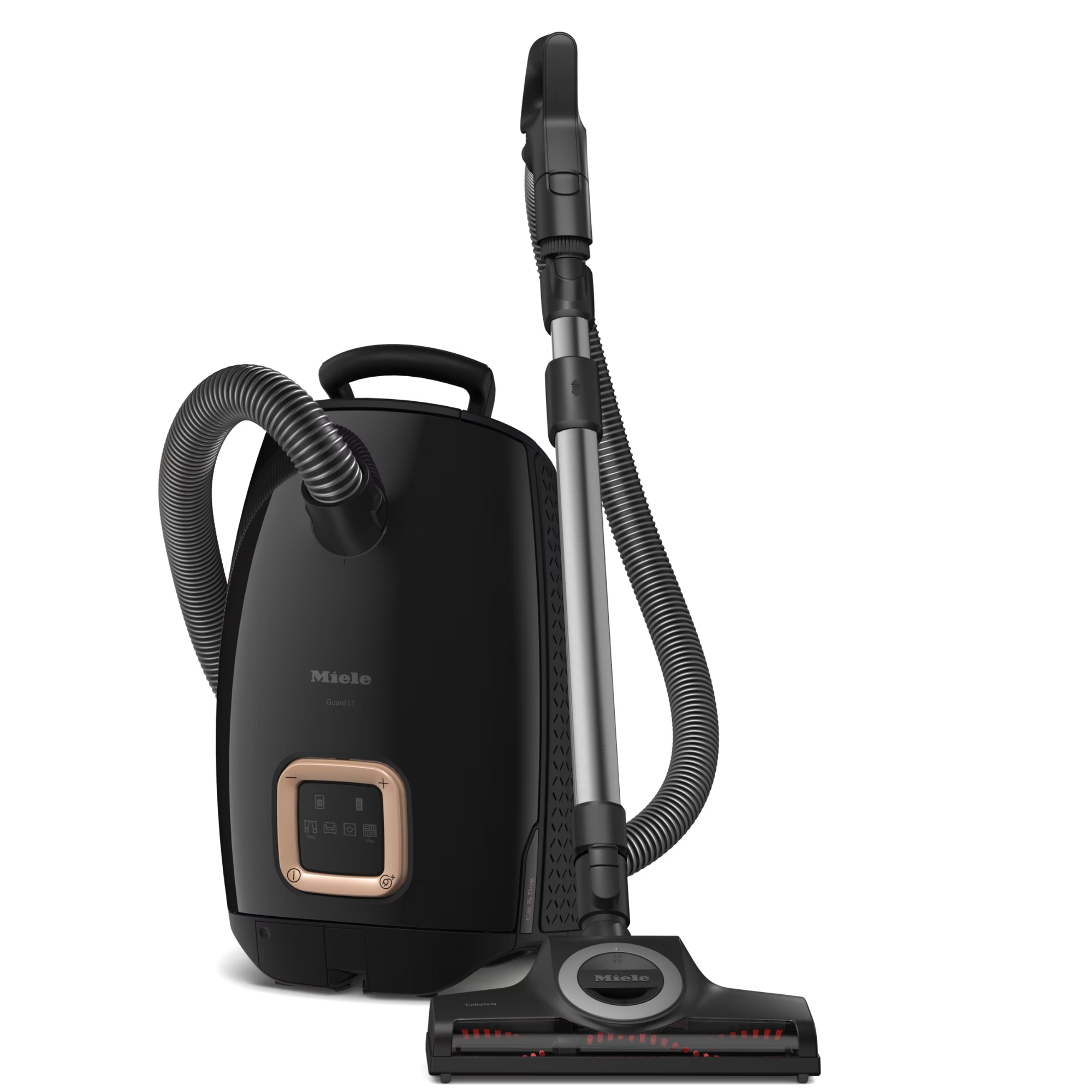
The best canister vacuum for versatile cleaning and unmatched performance
With the strongest suction we've ever tested, along with an intuitively thoughtful design and flawless suction on any surface – this is the best-performing vacuum you can buy. Whether hair, dust or large debris, the Guard L1 Cat & Dog can handle every cleaning task with ease, and will last longer than a decade with the right care.
Head to our best canister vacuums section for more details.
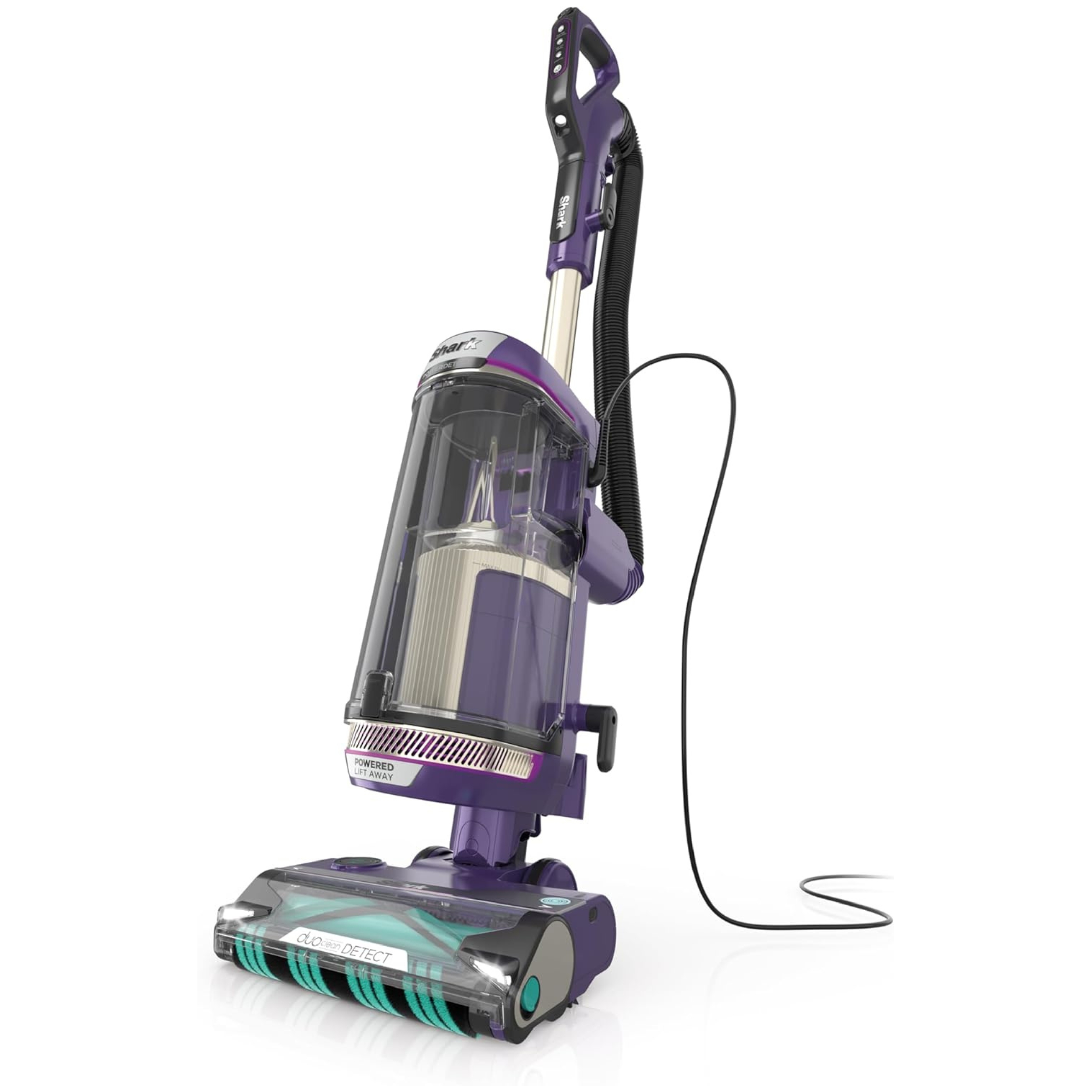
The best upright vacuum for big, messy homes
A relentless powerhouse of a vacuum that can effortlessly pick up all debris, especially animal hair, while being able to dig deep into carpets with its dual-brushroll floorhead. It also neutralizes odors and has a lightweight lift-away pod for more mobility when cleaning stairs, cars or furniture.
Head to our best upright vacuums section for more details.
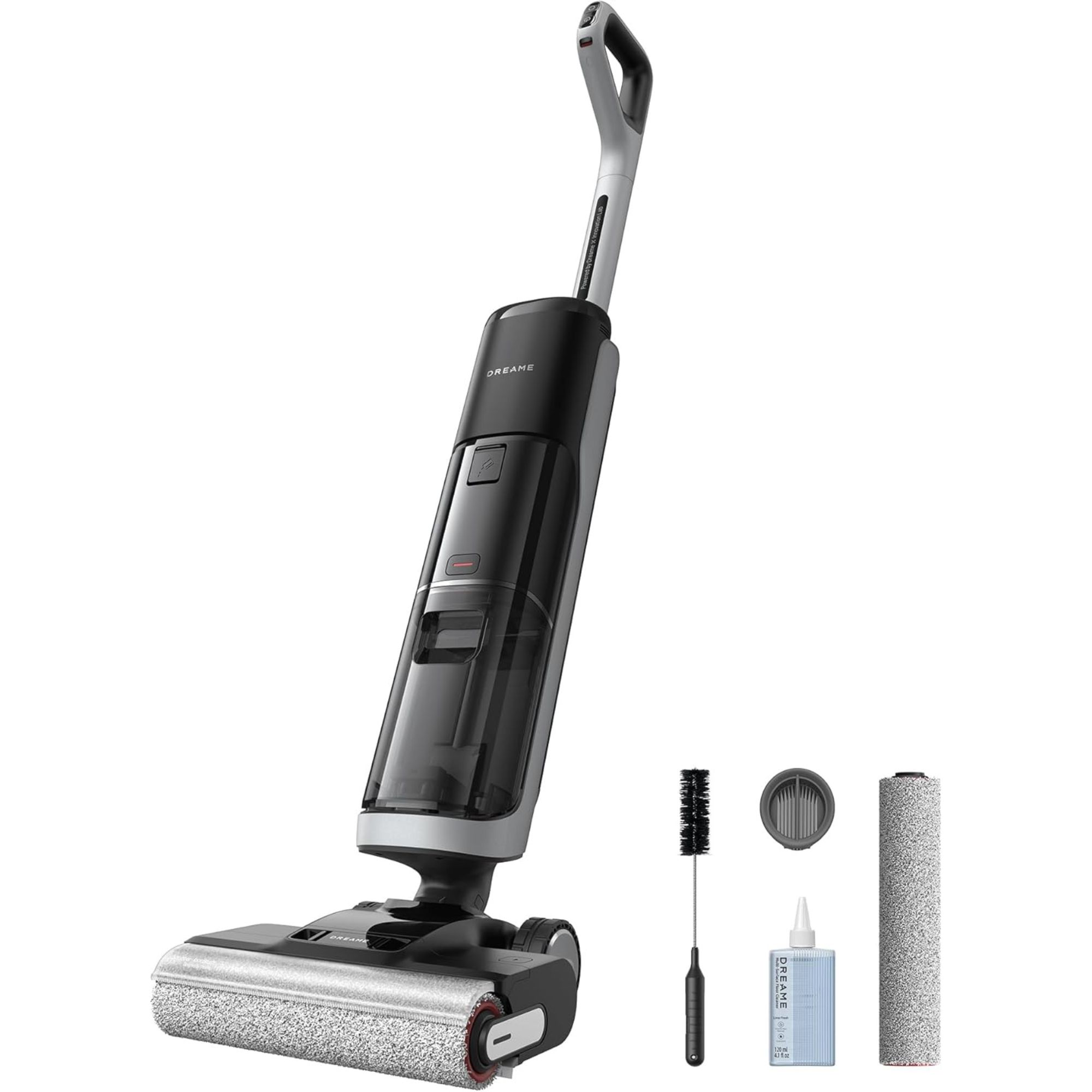
The best vacuum-mop combo, for wet and dry messes
Using the Dreame H14 Pro has genuinely cut my floor cleaning time in half, vacuuming and mopping simultaneously while picking up every mess instantly, then leaving the floors dry a moment later.
Head to our best vacuum-mop combos section for more details.
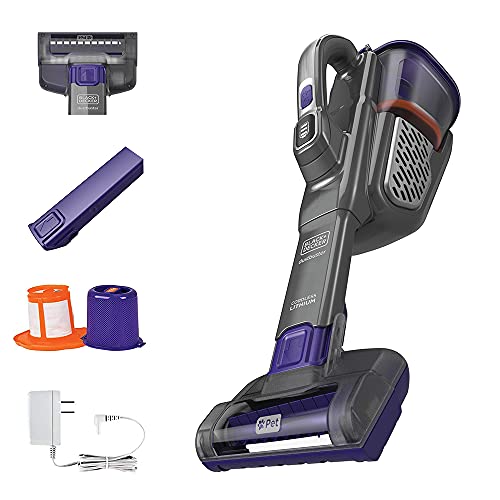
The best handheld vacuum for quick clean-ups, cars, and tight spaces
This handheld vacuum from Black+Decker can match the cleaning power of some full-sized cordless vacuums, with a handy motorized brush tool for getting hair out of carpets and upholstery.
Head to our best handheld vacuums section for more details.
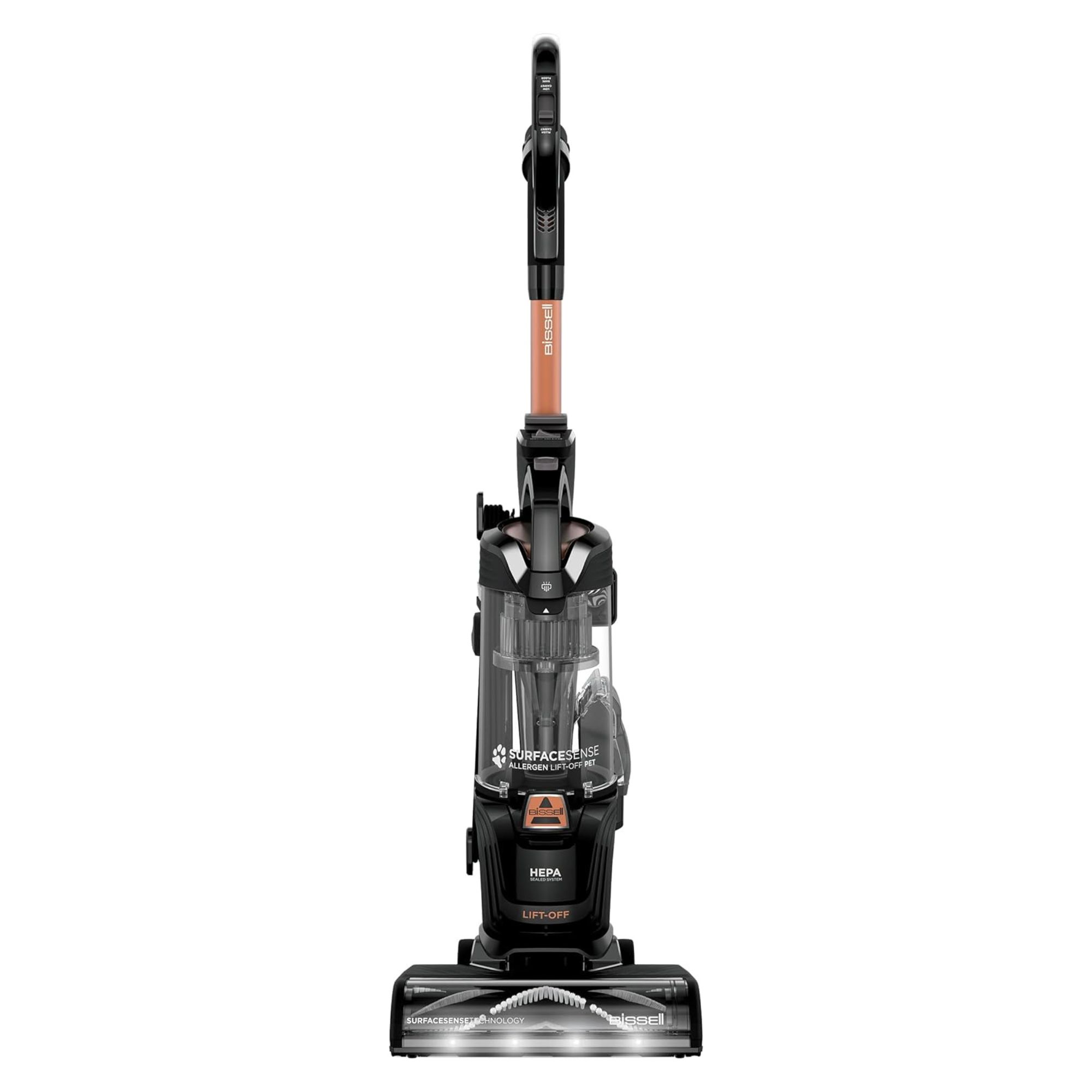
The best budget upright vacuum for big cleaning tasks at a small cost
This budget-friendly Bissell vacuum adopts many of the features you'd expect in premium Shark models, but for $100-200 less. It cleans well across every surface, adapts suction to different floors, and has a lift-away module for easier cleaning.
Head to our best upright vacuums section for more details.
And here they are in an at-a-glance table:
Model | Type | Battery life/cord length | Filter | Price range US | Price range UK |
Dyson V15 Detect | Cordless | Up to 60 minutes | HEPA (whole-machine) | $599–$799 | £499-£650 |
Miele Guard L1 Cat & Dog | Canister | 24 feet (36 feet with hose) | Active AirClean post-motor filter + HyClean Pure TU vacuum bag | $699-$899 | £299-£399 |
Shark POWERDETECT Upright | Upright | 30 feet | HEPA with Anti-Allergen Complete Seal | $349-$549 | £279-£429 |
Dreame H14 Pro | Vacuum-mop combo (cordless) | Up to 40 minutes | Water and dirt debris filter | $349.99-$499.99 | £399-£499 |
Black+Decker dustbuster furbuster AdvanceClean+ Pet | Handheld (cordless) | Up to 10 minutes | Non-HEPA (washable pre-filter + filter) | $80–$100 | £70-£109 |
Bissell SurfaceSense Allergen Pet Lift-Off | Upright | 27 feet | HEPA Sealed Allergen System | $250–$380 | N/A |
The Best Vacuums by Type
If you already know which type of vacuum you want, this is my top three shortlist of the most highly-rated vacuums in each category at different price points.
If you're still not sure, it's worth jumping down the page to my "choosing a vacuum" section, which will help you understand your options.
The Best Cordless Vacuums
Cordless vacuums are a popular choice, offering lightweight, easy cleaning while taking up minimal storage space. They're not typically as powerful as uprights or canisters, but unless you live in a big, messy home, they get the job done.
They also have shorter lifespans compared to corded vacuums, averaging around 3-5 years compared to the 8-10+ years for upright and canister vacuums. See our corded vs cordless vacuums section for a deeper dive.
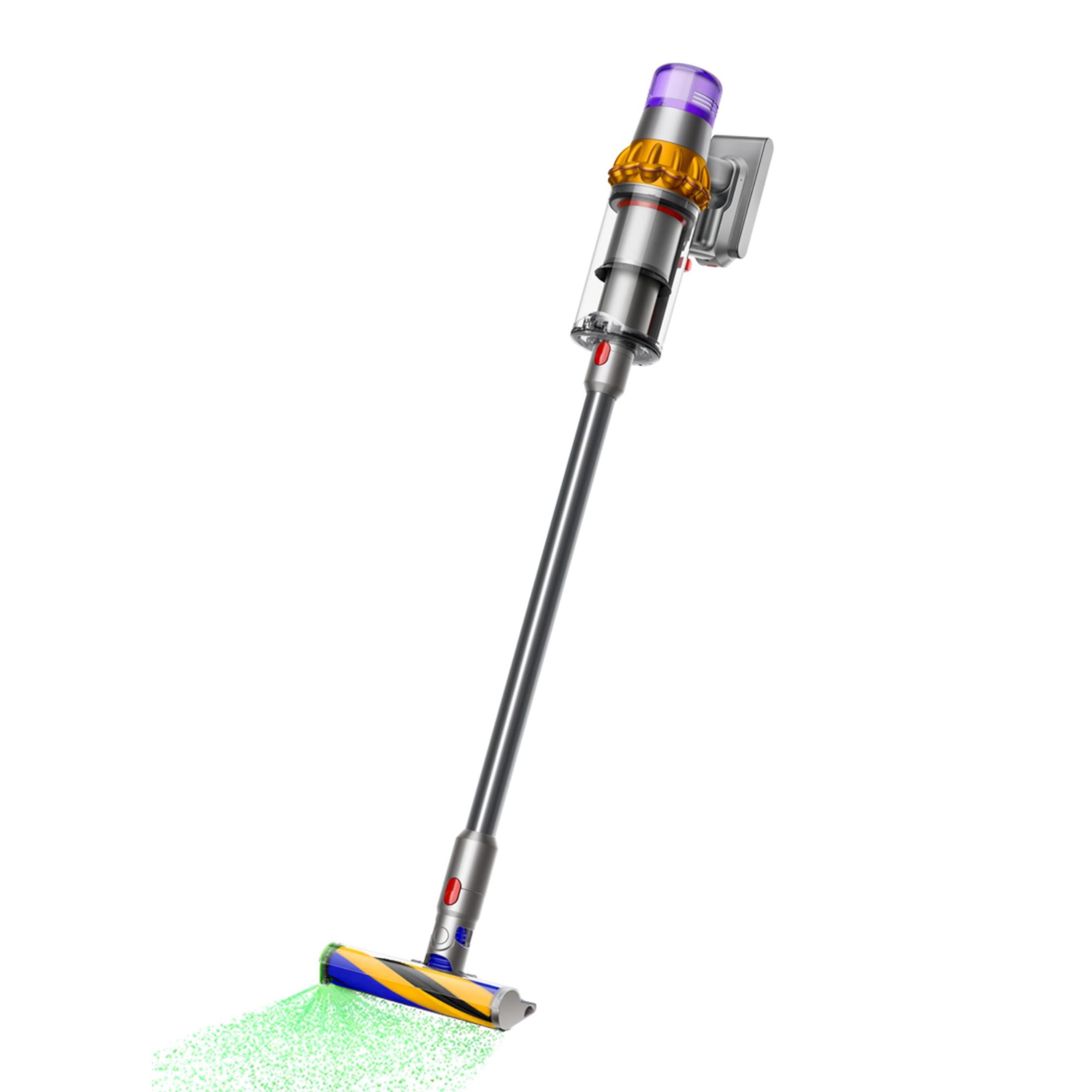
The best cordless vacuum in all aspects, including animal hair
This is one of the most powerful vacuums I have ever tested. It pulls up an astonishing amount of deep debris and hair, illuminates hidden dust, and automatically adjusts suction to your floor type and dirt levels. It's expensive, but it's the best cordless vacuum we've tested, and the only one I use in my own home outside of testing.
Read more in my full Dyson V15 Detect review.
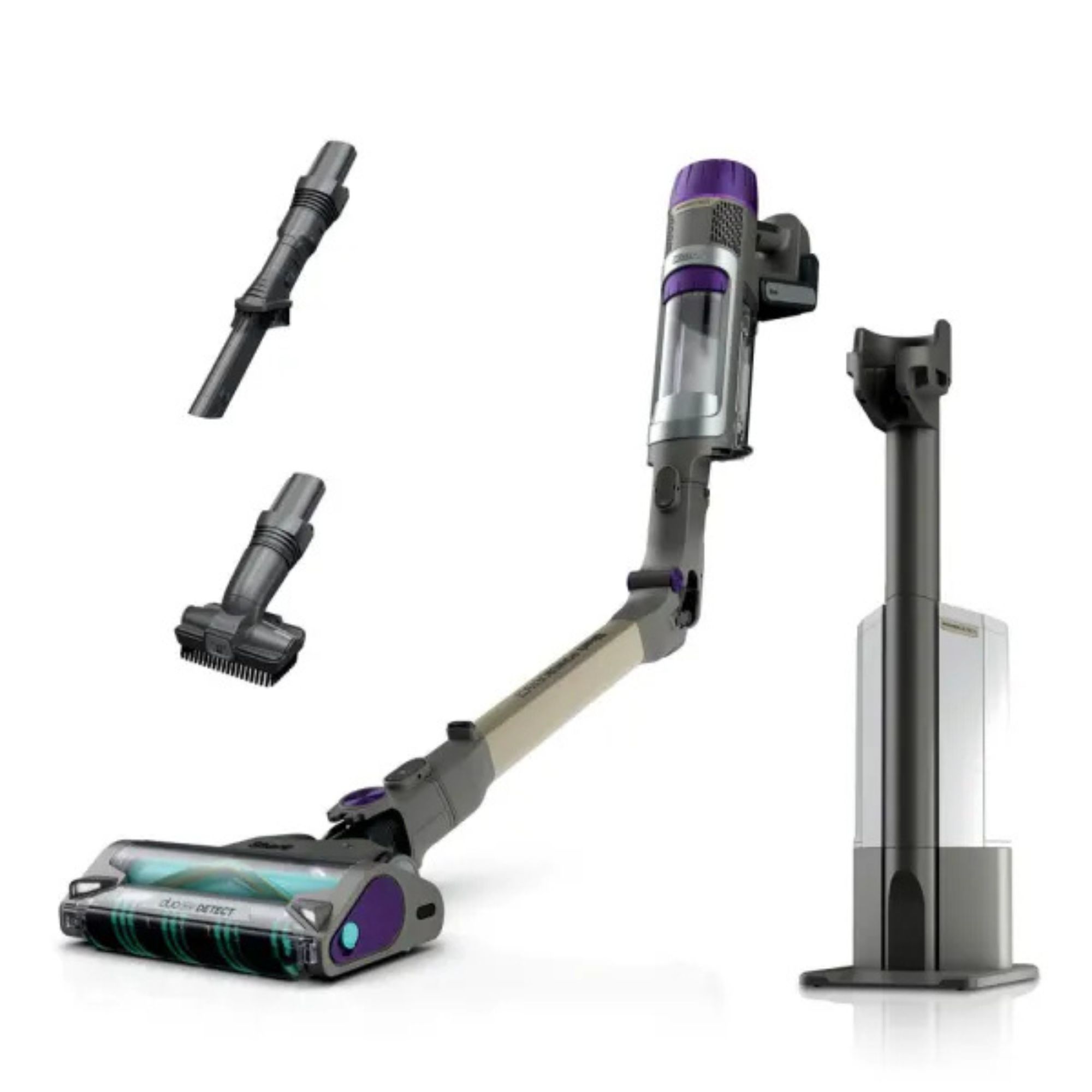
The runner-up best cordless vacuum
It offers strong suction on all surfaces, a flexible wand for easier mobility, and an odor-neutralizer to leave your home smelling fresher. Its smart features aren't quite up to Dyson's standards, but it's an incredibly powerful cordless vacuum, and it costs hundreds of dollars less.
Read more in our full Shark PowerDetect Cordless review.
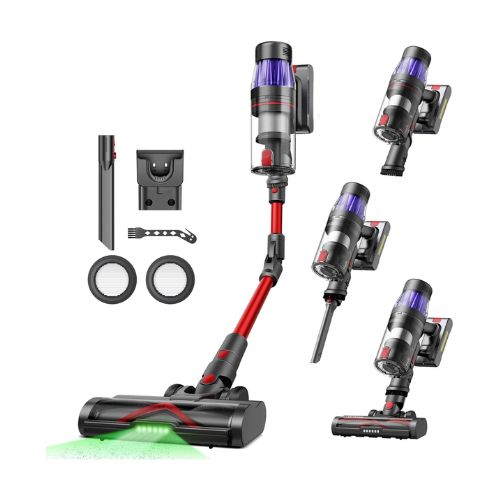
The best budget cordless vacuum
A rare, budget-friendly option, the U16 Flex is one of the only sub-$200 vacuums I'll ever recommend. It can vacuum hard floors and thin rugs impressively well for the price, and it even has a green laser that reveals hidden dust, just like you'll find in a premium Dyson.
Read more in my full Ultenic U16 Flex review.
The Best Upright Vacuums
Upright vacuums are the ideal choice if you have a large home, carpets, kids, and/or furry indoor friends. Unrestricted by the power and clean duration limitations of a battery, they provide some of the highest suction and strongest cleaning performance of any vacuum type, and they're self-contained, unlike canister vacuums, which require more storage space.
But they're heavy, loud, and demand a fair amount of storage space that small apartments may not have. See our upright vs canister vacuums section for more guidance.

The best upright vacuum in all aspects, including animal hair
With Shark's latest vacuum tech, including dust and floor detection and adaptive suction, this highly powerful model trumps all other upright vacuums we've tested, picking up all hair and debris in a single pass, no matter the floor type. If it's within your price range, this is the only upright model worth considering.
Read more in our full Shark POWERDETECT Upright review.
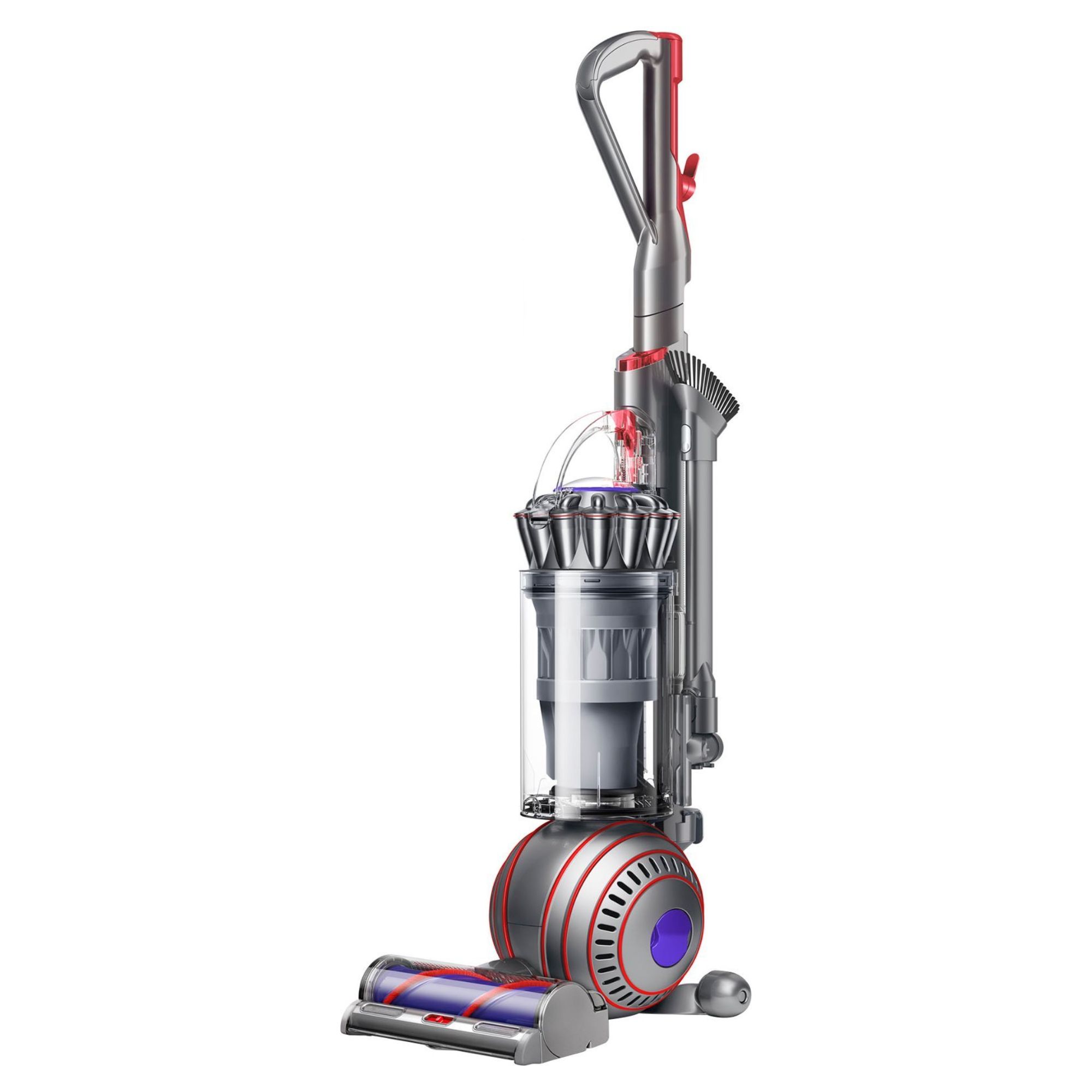
The second-best upright vacuum
Astonishingly good suction that's especially noticeable on carpets, utilizing a spherical mechanism for smooth, effortless control. It has the highest suction of any corded Dyson, so much so that it grips tightly to the floor while vacuuming. It doesn't have the convenient features of the Shark POWERDETECT however, such as anti-odor tech.
Read more in our full Dyson Ball Animal 3 review.

The best budget upright vacuum
It may not clean as swiftly as the Shark and Dyson, but this Bissell vacuum performs impressively well considering it costs over $100 less. It adapts to your floor type and can lift-away for more mobility when cleaning, which is rare at this price.
Read more in our full Bissell SurfaceSense Allergen Pet Lift-Off review.
The Best Canister Vacuums
Canister vacuums are among the most durable, high-performing, and versatile models, with a fully flexible hose that allows for easy cleaning without becoming too cumbersome. They work great on all floor types, and you can find bagged models that help reduce allergy symptoms.
They tend to be expensive, however, and require the most floor space when storing your vacuum type. See our upright vs canister vacuums section for more guidance.

The best canister vacuum in all aspects, including animal hair
With the all-round strongest performance of any vacuum we've tested, the Miele Guard L1 Cat & Dog is not only our best bagged canister, but the best overall. It cleans every surface effortlessly, and the spacious vacuum bags will capture dust and allergens.
Read more in my full Miele Guard L1 Cat & Dog review.
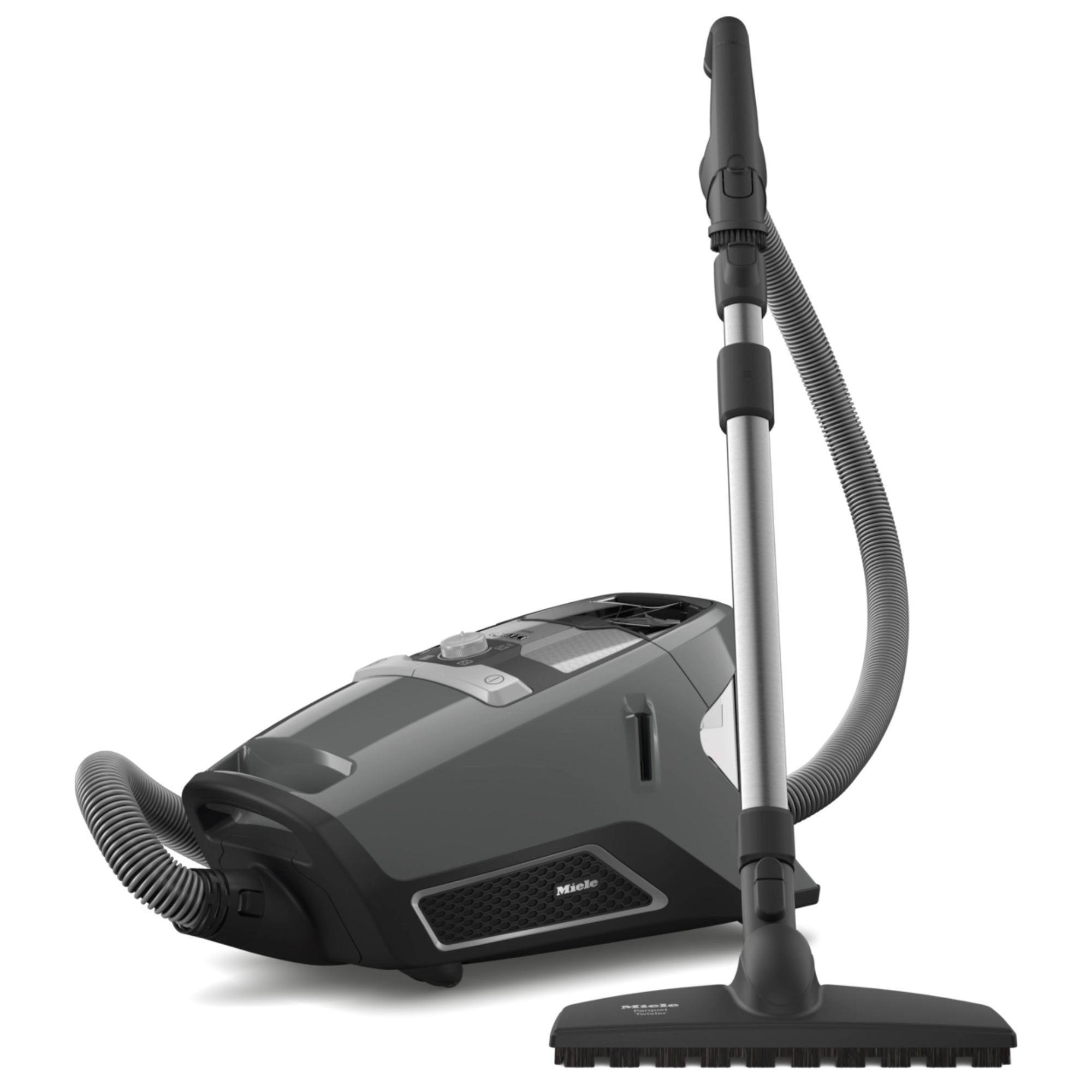
The best bagless canister vacuum
The Blizzard CX1 boasts high suction power and a user-friendly, self-contained design, with excellent performance across all surfaces. It also has a generous (and easy to empty) dustbin, four suction modes, and foot switches for hands-free cleaning.
Read more in my full Miele Blizzard CX1 Cat & Dog review.
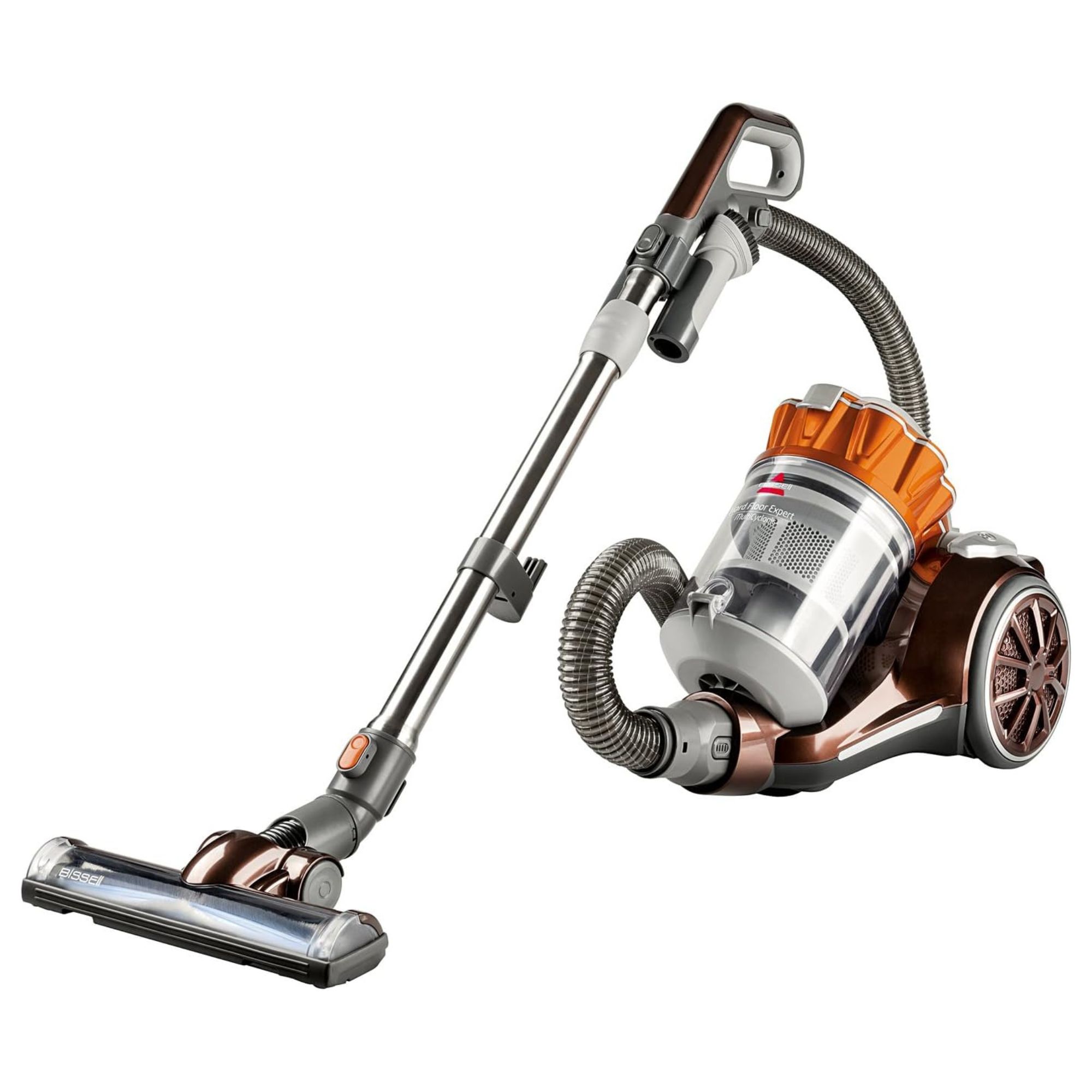
The best budget-friendly canister vacuum, for hard floors
If your home has no carpets or rugs, you can save $100s compared to the top Miele vacuums with Bissell's Hard Floor Expert, a bagless canister vacuum with strong suction, a telescoping wand, and a large, easy-to-empty dustbin.
Read more in our full Bissell Hard Floor Expert review.
The Best Handheld Vacuums
Handheld vacuums are great for quick clean-ups. Having one to hand in the living room or kitchen can help prevent crumbs and animal fluff from building up, meaning your weekly cleans are less intensive. They're also perfect for vacuuming cars and tight spaces, such as the stairs or under furniture.
They won't replace your full-sized vacuum, however, and they rarely have HEPA filtration.
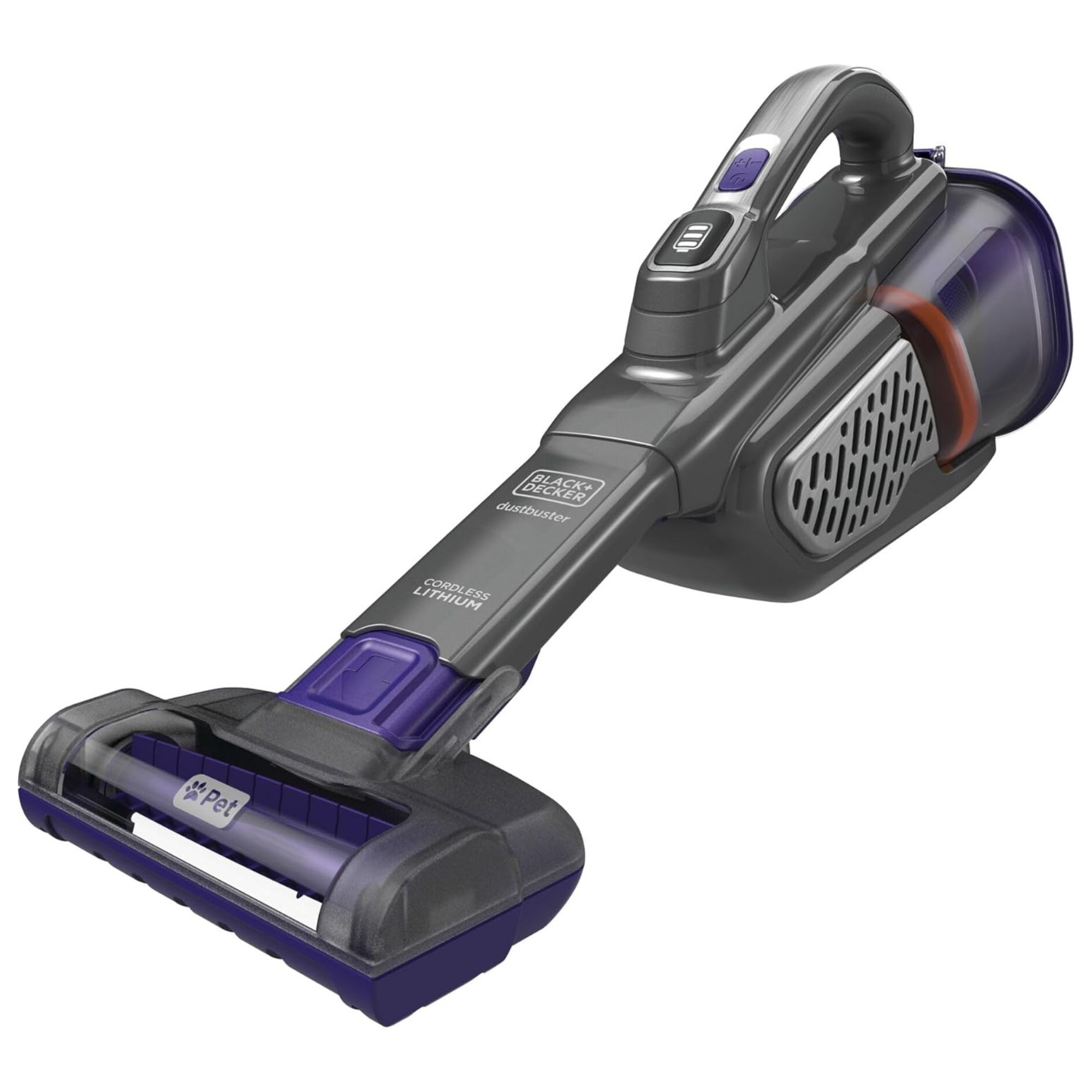
The best handheld vacuum
The Black+Decker dustbuster furbuster is surprisingly powerful for such a small vacuum, and it comes with a motorized cleaning head that's able to pull hair out of carpets and furniture. I've never used a handheld vacuum that cleans this well.
Read more in my full Black+Decker dustbuster furbuster AdvanceClean+ Pet review.
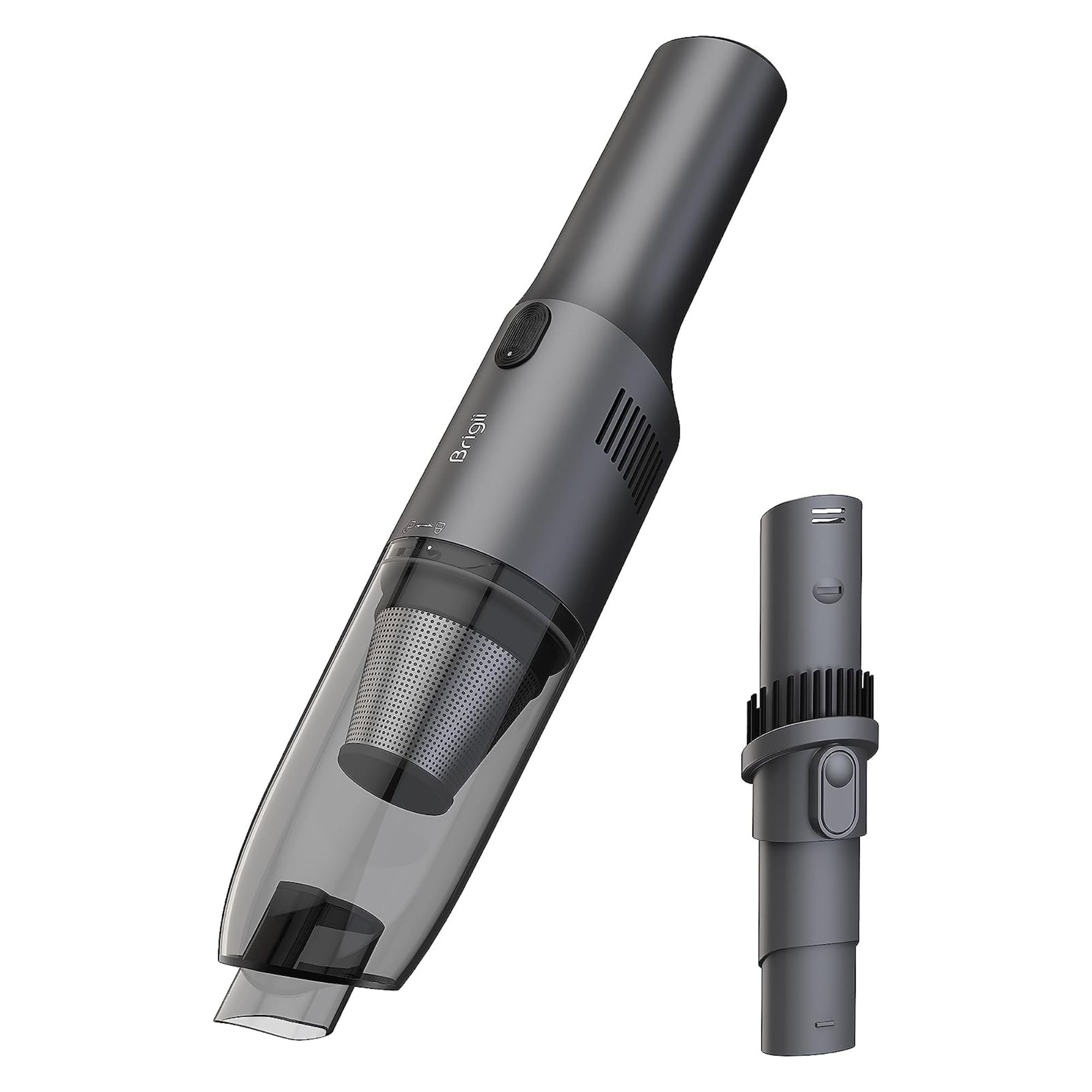
The runner-up best handheld vacuum
More of a basic model than the Black+Decker, our second pick is the Brigii Cordless Handheld thanks to its simple design and effective cleaning on all surfaces. It only comes with a couple of attachments, but we found they worked great on a variety of messes.
Read more in our full Brigii Cordless Handheld review.
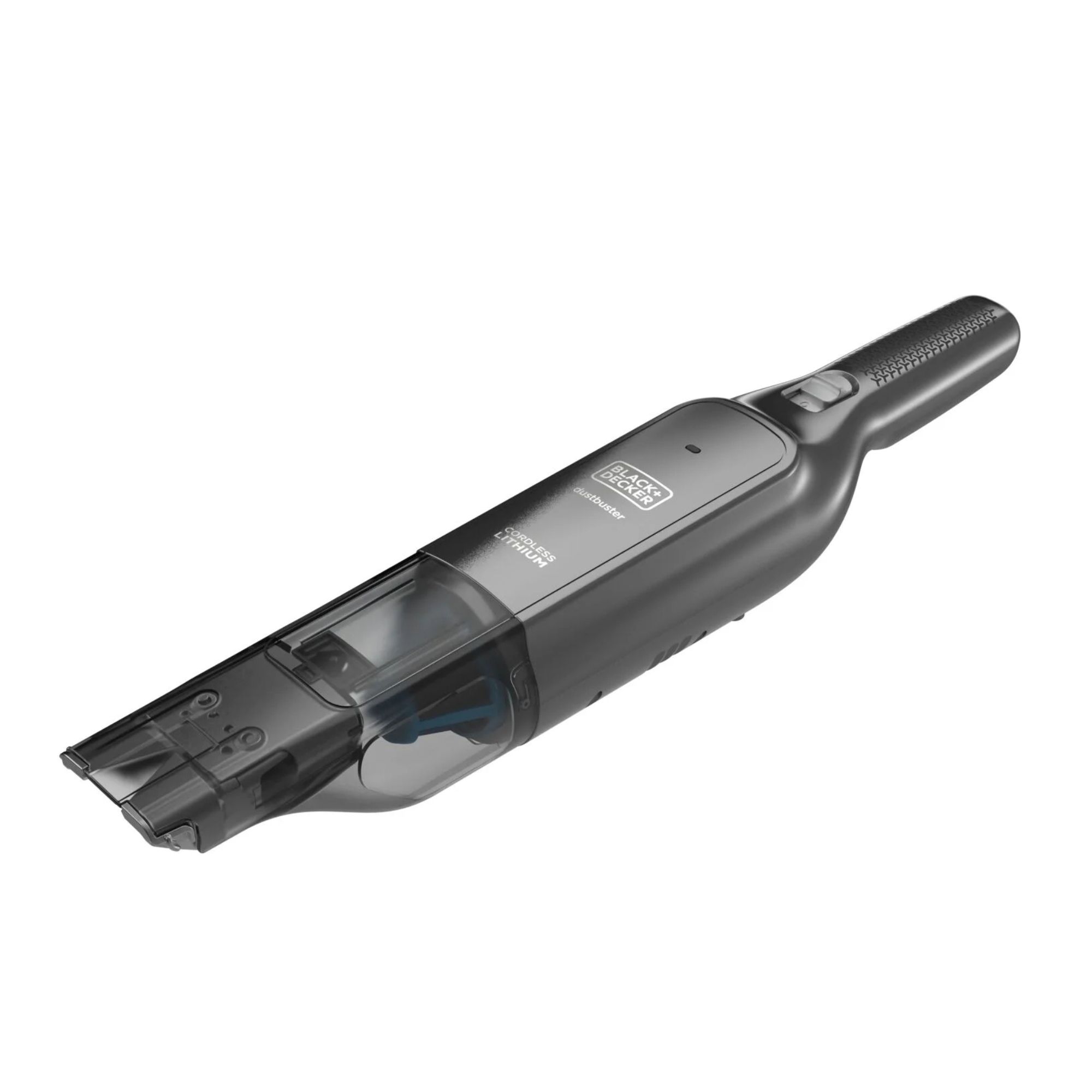
The best budget handheld vacuum
This isn't the most powerful handheld vacuum, nor the most capacious, but it's just the right size to deal with small messes on smooth surfaces (as it struggles when cleaning carpets). A great way to save money if you're only dealing with easy mess.
Read more in my full Black+Decker 12V MAX Dustbuster review.
The Best Vacuum-Mop Combos
Rising sharply in popularity, vacuum-mop combos combine vacuuming and mopping into one swift task. They vacuum solids and liquids, clean stains, and wash your floors at the same time, meaning they can drastically reduce how long you'll need to spend cleaning your floors. I use one at home and it has cut my hard floor cleaning time in half, and couldn't recommend them more.
If you have any carpets or rugs, however, you'll still need a dry vacuum. See our wet vs dry vacuuming section to learn more.
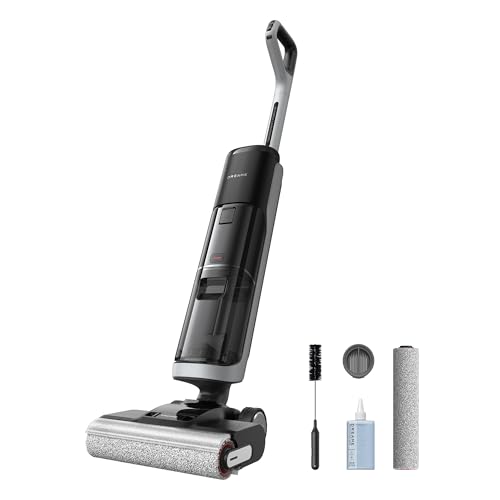
The best vacuum-mop combo
The full package. The Dreame H14 Pro handled all messes swiftly and thoroughly, and is so easy to use that it demands hardly any effort at all. It can lie completely flat, self-clean, self-dry, and has a sleek control screen.
Read more in my full Dreame H14 Pro review.
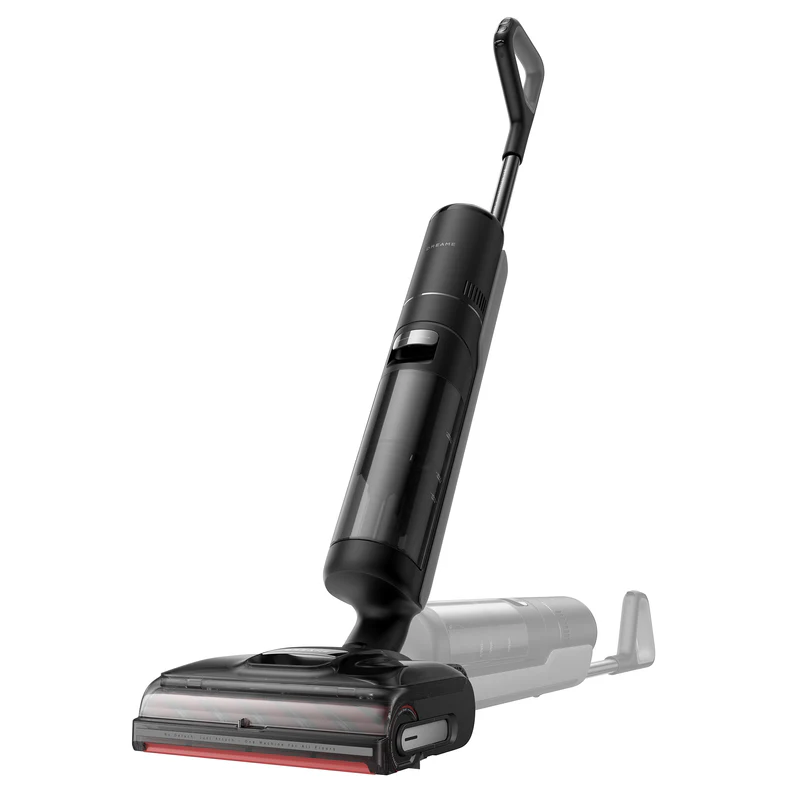
The best vacuum-mop combo that can vacuum rugs carpets
Typically, if you have a vacuum-mop combo, you'll still need a regular vacuum to tackle rugs and carpets, as the wet cleaning can damage soft flooring. But the Dreame H15 Pro CarpetFlex has a dry vacuum function that worked surprisingly well on test, and unless you have high-pile carpet, this could be all you need.
Read more in my full Dreame H15 Pro CarpetFlex review.
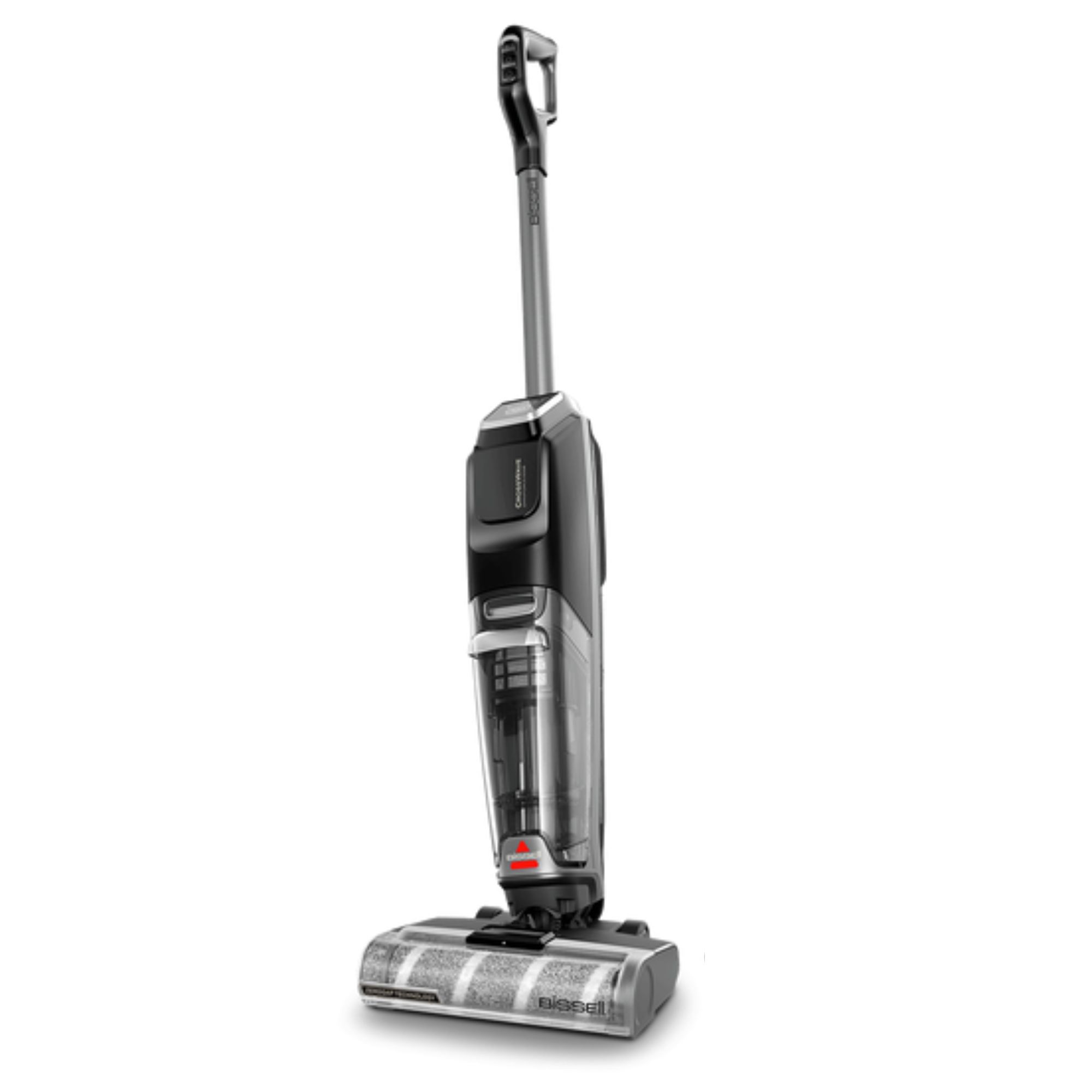
The best budget vacuum-mop combo
It doesn't clean as effectively as the Dreame or Tineco, but the Bissell CrossWave OmniForce costs $100s less and can still clean solids, liquids and stains from hard floors. Plus, it's the only vacuum-mop combo that can also be used as a dry vacuum on carpets.
Read more in my full Bissell Crosswave OmniForce Edge review.
The Best Robot Vacuums
We have a dedicated guide on the best robot vacuums, with videos and reviews showing off their real-world results. But here are our top three at a glance:

The best robot vacuum you can buy
With all-round incredible performance on carpets and hard floors, the S20 Infinity will leave your floors spotless every day, leaving only the occasional clean to do yourself. It's one of the easiest ways to majorly reduce how much time you spend cleaning.
Read more in our full Yeedi S20 Infinity review.
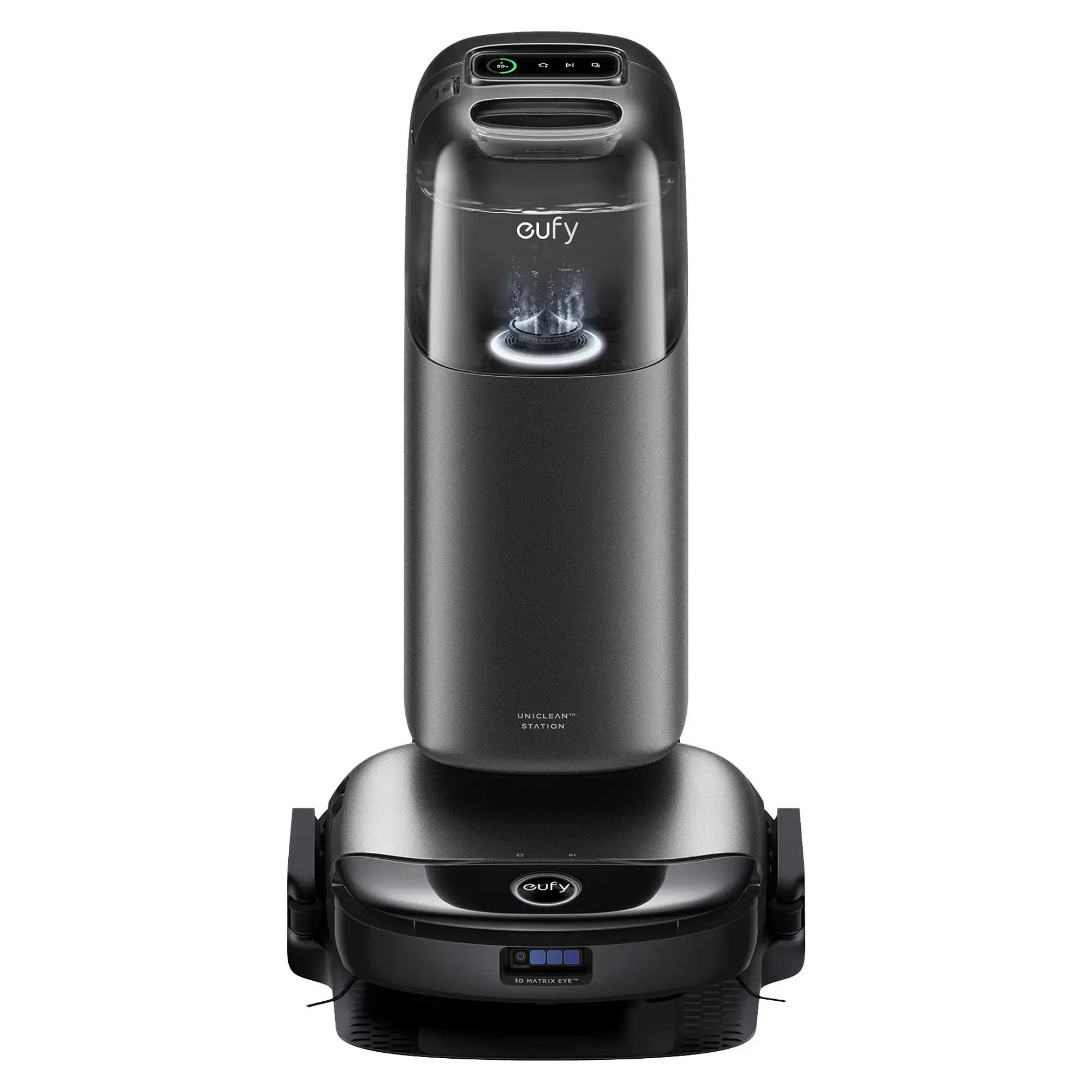
The best robot vacuum for pet hair
This incredibly sophisticated robot vacuum matches the cleaning power of some full-sized vacuums, with robust vacuuming, mopping, and hair removal for daily clean floors. It reduced our tester's need for canister vacuum use by 90%.
Read more in our full eufy Omni S1 Pro review.

The best budget robot vacuum cleaner
Upon first release this robot vacuum cost almost a grand, but now that it's been proceeded by eufy's more advanced models, you can find it for just $300-$400 depending on promotions. But don't let its age fool you – it's still a reliable, powerful robot with strong navigation and a straightforward app.
Read more in our full eufy X10 Pro Omni review.
The Best Vacuums by Flooring
If you're still not sure which vacuum to choose, researching by flooring type can help narrow down your shortlist.
For larger homes with more than one (or two, or three) flooring types, you'll need a great all-rounder, though I'd also recommend buying more than one vacuum if, for example, you have hard floors downstairs and carpet throughout upstairs, particularly if you have a housekeeping closet upstairs in which your second could be stored.
The Best Vacuums for Carpet
The best vacuum for carpet needs strong suction and a bristled brushroll that can agitate carpet fibers. Dirt, dust, and hair become trapped in carpet fibers, particularly in thick-pile carpets and those with looped fibers, so the combination of suction and agitation is essential.
Generally, upright vacuums are best for carpets. They have more powerful motors, more robust floorheads, and larger dustbins to account for the high volume of mess that carpets can hold.
See our floor types section to learn more.

The best vacuum cleaner for carpets
Shark's latest upright vacuum is an absolute powerhouse, clearing all dust, debris, and hair from carpet in a single pass, with floor detection and responsive suction to make cleaning easier as you pass from thick rugs to low-pile carpets to hard floors.
Read more in our full Shark POWERDETECT Upright review.

The best canister vacuum for carpets
With the Miele Guard L1 Cat & Dog's immense suction – higher than any vacuum we've tested – this is a stellar choice for pulling dirt, dust and hair from deep within your carpets. Its only downside if that the brushroll can wrap with hair and long threads, so you'll have to occasionally cut it out.
Read more in my full Miele Guard L1 Cat & Dog review.
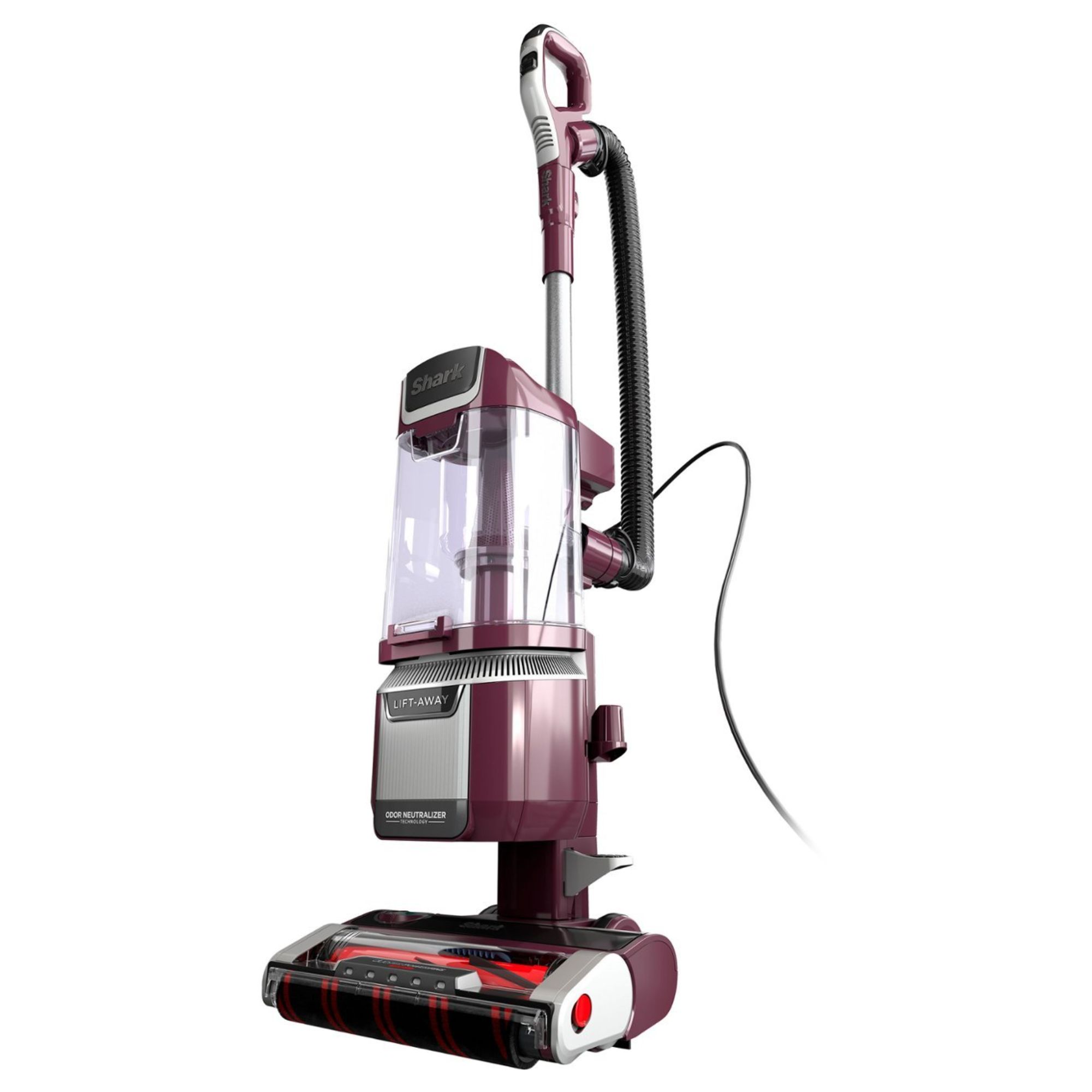
The best budget vacuum for carpet
Often on offer for under $200, this upright vacuum boasts powerful suction, a dedicated carpet mode, odor-neutralizing, and a Lift-Away feature for more agile cleaning. It performed impressively well on test too, deep cleaning carpet in only a couple passes.
Read more in our full Shark Rotator Pet Lift-Away review.
The Best Vacuums for Hard Floors
The best vacuum for hard floors will have a soft roller to prevent scratching delicate surfaces and to capture all the fine dust particles. As hard floors are easier to clean than carpets, suction isn't as important, and you can get away with spending a little less. See our floor types section to learn more.

Best vacuum for hardwood floors
With excellent suction, a laser to illuminate hidden dust and a soft brush roll to protect wood – this is the very best vacuum for hard floors, whether tile, hardwood, laminate, linoleum or vinyl. It's also incredibly lightweight and it senses how dirty your floors are for optimal suction power.
Read more in my full Dyson V12 Detect Slim review.
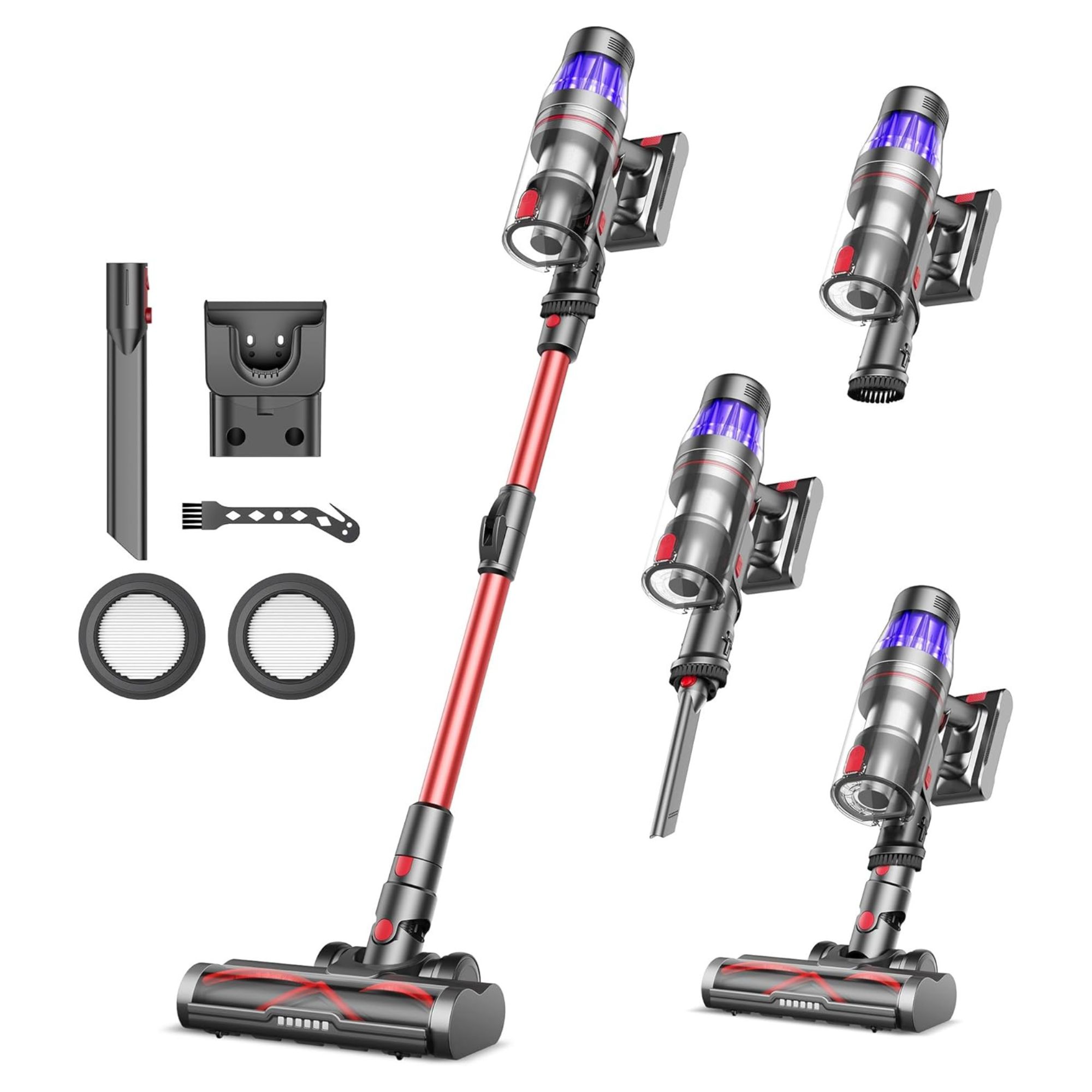
Best budget vacuum for hardwood floors
For under $200, the Ultenic U16 Flex is a surprisingly powerful vacuum that shines on hard floors and has a green laser similar to those you'd find in a $750 Dyson.
Read more in my full Ultenic U16 Flex review.
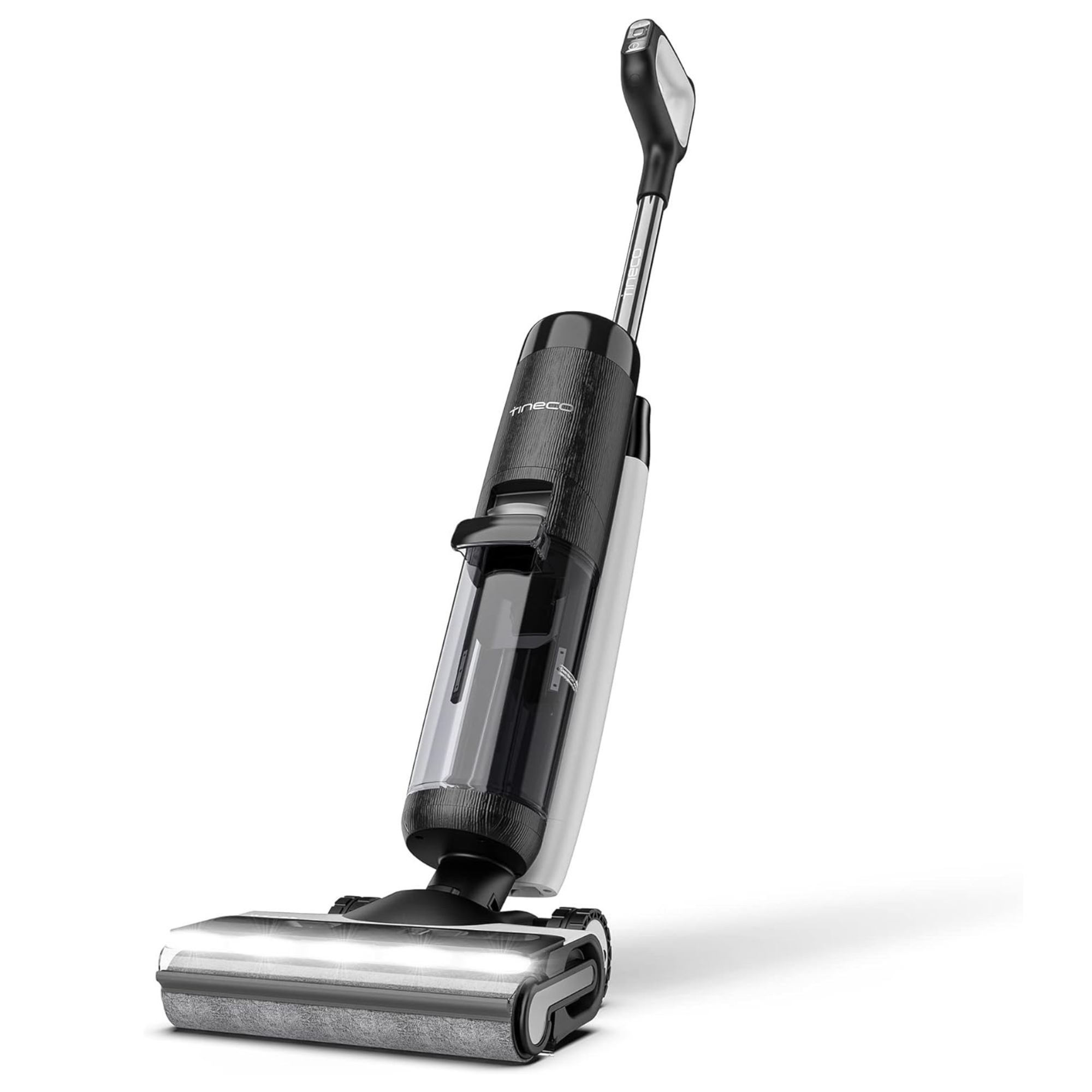
Best vacuum-mop combo for hardwood floors
The full package. Vacuum, mop and remove stains from your floors with this one smart wet floor cleaner that cleaned every substance swiftly in our tests. It's great for moisture-sensitive floors such as hardwood as it leaves the floors dry in under two minutes.
Read more in my full Tineco Floor One S7 Pro review.
The Best Multi-Surface Vacuum
If you have a mix of carpets and hard floors, you'll want a vacuum cleaner that can effectively clean both while seamlessly passing from one to another. Dyson, Miele and Shark have the strongest offerings here, but in different ways:
- The Dyson V15 Detect and Dyson V12 Detect Slim have two separate floorheads, one with a soft roller and one bristled, that you can quickly swap out when vacuuming different floor types, giving each surface the perfect clean.
- Like the Dysons, the Miele Guard L1 Cat & Dog [Walmart] and the Miele Blizzard CX1 Cat & Dog [Lowe's] have separate floorheads, but I've found that the carpet-focused TurboTeQ works best across them all, and I rarely use the other.
- The Shark PowerDetect Cordless and the Shark POWERDETECT Upright have brushrolls designed to pass from one floor to another to avoid you having to swap anything out, but the cleaning is less specialized than the Dysons and MIeles.
The Best Vacuums by Use
Pet owner? You'll need a model that can deal with fur and dander. Not into heavy lifting? A lightweight vac will suit you most. These are my top buys.
The Best Vacuums for Pet Owners
I'll keep this light as we have a dedicated guide to the best vacuums for pet hair, with more detailed results from our tests on real fur. But at a glance, these are my top picks after testing at a local animal shelter and in homes with cats and dogs:
- The Shark POWERDETECT Upright and the Miele Guard L1 Cat & Dog [Walmart] are the best corded vacuums on animal hair. They're incredibly powerful vacuums that sucks up hair (and dust and debris) from thick carpets like it's nothing.
- The Dyson V15 Detect is the best cordless vacuum for those with indoor animals, with suction that matches the power of a corded upright. I tested it at a local cat and dog shelter, and it performed better than corded vacuums I've tested there, and its Motorbar floorhead is exceptional at pulling fur from carpets without ever getting tangled. The Dyson V11 is a cheaper option if the V15 Detect's price puts you off.
- If you're on a budget, the Ultenic U16 Flex [at Amazon] and the Bissell SurfaceSense Allergen Pet Lift-Off are great cordless and upright picks, respectively. They're not as effective as the Dyson or Shark, but they still do a decent job at vacuuming fur from different floor types.
The Best Lightweight Vacuums
For anybody cleaning with chronic pain, limited mobility, or who simply doesn't want to lug a weighty vacuum around, a lightweight vacuum is the solution. Cordless sticks reign supreme here, and they don't always have to come at a sacrifice of suction power:
- The Dyson V12 Detect Slim is the slimmer, lighter version of the Dyson V15 Detect – our best-on-test cordless vacuum. Weighing just 5.22lbs, it's lighter than your average cordless stick (typically 6-8lbs) and much lighter than upright models (typically 16-19lbs). It's also incredibly powerful, boasting Dyson's latest dust-revealing technology with a strong performance on all floor types.
- The Ultenic U16 Flex [at Amazon] is even lighter, weighing 3.75lbs, but I only recommend it if your home has hard floors. It isn't the best on carpets, but it does have a green light that reveals hidden dust similar to a $750 Dyson.
- If you're set on a corded vacuum, the best Miele vacuums such as the Miele Blizzard CX1 Cat & Dog [Lowe's] don't require you to carry the entire vacuum around, as it's housed in a separate canister that you pull behind you. It means you're only carrying the handle, wand and floorhead, freeing up your other hand for moving objects and opening doors.
- Or if you're after an upright, the Shark Stratos weighs 16.71 lbs – a few pounds lighter than the other upright vacuums we've tested. It also has a 'Lift-Away' pod that detaches from the main vacuum unit for easier, lighter cleaning – similar to a canister vacuum but with less reach.
How to Choose the Best Vacuum Cleaner
I have spent the past two years testing, reviewing, and writing almost exclusively about vacuum cleaners (that's me in the video above). This is definitively how to choose a vacuum cleaner based on your home's needs.
The vacuum links in this section will take you to our full reviews, not retailers, so you're equipped with the pros and cons of each model to find the vacuum that suits your needs.
1. Start with your Floor Type
The types of floors you have across your home should dictate what vacuum you go for.
Carpets and rugs: If your home has lots of carpets or rugs, you'll need a vacuum with strong suction and a motorized floorhead with sharp bristles, as these are the most effective. Upright and canister vacuums tend to work best due to their large motors, resulting in stronger suction that can pull the dirt and dust that's attached to carpet fibers more stubbornly than on smooth surfaces.
The Shark POWERDETECT Upright and the Miele Guard L1 Cat & Dog are the best vacuums we've tested on carpet, boasting flawless performance on fur and other animal debris too.
It helps to have a vacuum with airflow that's unrestricted by the limitations of a cordless battery, so I don't typically recommend cordless sticks if you have lots of thick carpet in your home. But if you're committed to cordless convenience there are a few exceptions, notably the Dyson V15 Detect and the Dyson V11, as their suction exceeds what you'll find in most cordless models, and the floorheads are superb at cleaning carpet.
Hard floors: If your home has mostly hard floors, particularly ones with delicate surfaces like tile or hardwood, you'll be better off choosing a vacuum with a soft brushroll. Hard floors don't need to be vacuumed with sharp, brushed floorheads, as particles are picked up more easily by the suction. Plus, a smooth roller provides consistent, continuous contact with the floor to capture the micro-sized particles.
Hard floors are also easier to clean than carpets as there are no fibers that trap dirt. That's why cordless vacuums (with their lower suction) are a great choice – you're saving space, you can clean with one hand, and you don't have to keep moving to the next power outlet.
The best vacuums for hardwood floors have gentle floorheads with fewer sharp edges to prevent causing damage, and the soft brushroll can capture many of the super-fine particles that are difficult to vacuum on carpet. The Dyson V12 Detect Slim is our favorite vacuum for hard floors, thanks to its safe, soft brushroll that captures super-fine common household allergens.
Multi-surface: You can get multi-surface vacuums, too, like the Shark Cordless PowerDetect with its dual-brushroll floorhead. It uses both a soft roller and a bristled one to clean effectively across every surface, without you having to swap the attachments out each time you move onto a different floor.
Or, Dyson's newest cordless models (including the V12 Detect Slim and the Dyson V15 Detect) have separate floorheads – one with a soft roller and one with brushes – for specialized cleaning on each floor type.
Head to our best vacuums by flooring section to choose a model for carpets, hard floors, or both.
2. Consider your Home's Size, Storage and your Mobility
Finding the right size vacuum cleaner depends on the size of your home and how much space you have to store your vacuum cleaner.
For big homes, particularly those with kids and pets, an upright or canister vacuum is almost always the right move, as long as you have the storage space. They tend to offer higher suction power, wider floorheads, and more agitating brushrolls to handle more serious messes, and you don't have to worry about running out of battery halfway through big cleaning sessions.
The Miele Guard L1 Cat & Dog and the Shark POWERDETECT are the best we've tested for big homes, with full sets of attachments to handle the hardest cleaning tasks around the house.
That being said, a cordless vacuum can still be useful in big homes if you're a frequent cleaner. I've spoken to countless householders with kids and pets who vacuum once or twice a day just to keep up with the mess, and if you're cleaning this often, a cordless vacuum can be a big help. As they're ready to grab and go, it can take seconds to clean up some spilled crumbs or animal hair.
But with a smaller size comes a smaller dustbin and limited battery life, so I'd suggest buying multiple vacuums, or extra batteries so that you can swap them out midway through the clean (Dyson and Shark sell spare batteries for most of their models) rather than having to pause to recharge. Extra batteries come at a cost, so if you rate cost-efficiency over ease, upright vacuums are the better value choice for larger homes. Upright vacuums also tend to have a longer lifespan.
If you want to cut down on your chore time, it's worth considering one of the best robot vacuums. They do a significant chunk of the floor cleaning for you, meaning your deeper cleans can be less frequent and intensive. They can run overnight too, and don't have to get in the way of your daily life.
For smaller homes or if you have limited mobility, cordless stick vacuums can be the perfect choice. They'll easily tackle the space, they're lightweight (typically around 6-8 lbs), they're easy to take up and down stairs, lift above your head when cleaning curtains or furniture, plus they're easier to store away. Cordless vacuums that can match the cleaning power of an upright or canister vacuum, such as the Dyson V15 Detect, tend, however, to be pricey. But unless you have lots of carpet, you can easily get by with a more affordable model, like the Shark PowerDetect Cordless or the Dreame R20.
For a deeper dive, see our cordless vs corded section.
3. Factor in Pets and Allergies
For a closer look, our best vacuums for pet hair guide is our go-to for proven results on real fur. But while you're hunting for your next vacuum, it's worth noting that pet owners have a few extra considerations when choosing the right vacuum, and many of them are useful for anyone with allergies (or hair!).
First off – a HEPA filter is non-negotiable. HEPA filters trap 99.97% of particles as small as 0.3 microns, which includes many common household allergens such as dander, dust, and pollen that trigger allergy symptoms.
Filters must meet strict criteria to have a HEPA label. Really, everybody should choose a vacuum with a HEPA filter as it's the standard for high filtration performance, but it's particularly important for pet owners.
Then, you'll want an anti-tangle floorhead. If you're frequently vacuuming animal hair, you'll find yourself manually cutting out hair too often without this, which could result in a loss of suction power or make you dread cleaning.
The Dyson Motorbar – found in most Dyson vacuums, including the Dyson V8 and the Dyson V11 – is the best anti-tangle floorhead we've used. But others from Shark and Bissell work great, too.
4. Appraise Noise and Energy
Noise: Sadly, a whisper-quiet vacuum cleaner isn't possible yet, but some are certainly quieter than others. While upright models boast the highest suction, they also tend to be louder than their cordless counterparts, and should potentially be avoided if you are noise-sensitive or have neighbors who might complain.
Handheld and cordless vacuums are the quietest. They typically produce 60-75 decibels of noise (we test using the DecibelX app), while upright models can go as loud as 80+ decibels. Prolonged exposure to that volume, which is similar to a garbage disposal running, can potentially result in hearing damage down the line, so it's important to consider your health alongside your cleaning needs.
Energy: The same goes for energy usage. Generally, the bigger and louder the vacuum is, the more energy it's consuming. Brands will usually list the wattage of their vacuums, and you'll find that upright and canister models use around 1,000-1,500W, while cordless models use around 200-600W.
But if you're thinking about slashing your energy bills by buying a cordless stick, it's worth noting that battery health fades over time. You'll be buying a replacement battery within 3-5 years (or a brand-new vacuum), which also contributes more to electronic waste than an upright or canister vacuum would.
5. Features to Consider (and Those to Avoid)
Suction power: Suction power is most accurately measured in air watts (AW), a figure that represents the arflow that pulls debris into the vacuum. Anything above 200AW is ideal – most upright and canister vacuums from reputable brands will have 200AW or higher, and a handful of cordless vacuums (notably the Dyson V15 Detect and Dyson Gen5detect) do, too.
100-150AW can be enough if your home has exclusively hard floors, as smooth surfaces don't require such high suction to be cleaned.
Frustratingly, most brands don't list an air watts figure, and instead just list wattage, which is the amount of power the vacuum uses. It's important not to get them confused as 1,000W is not 1,000AW.
If not listed, reading trusted reviews helps you find out how well each vacuum performs in real-world conditions.
Filter: I've covered HEPA filters briefly, but it's important to make sure your next vacuum has strong filtration. HEPA filters should be the aim if you want to reduce allergies at home, remove unwanted odors, and make sure clean air comes out of the vacuum while cleaning.
Be careful, as some brands will list 'HEPA-style' or 'HEPA-like' filters that haven't met the strict standards to be officially labeled as 'HEPA'. But some models, most notably the best Dyson vacuums, have filtration systems that actually exceed HEPA standards, and will be more effective than others when capturing allergens.
Without a HEPA filter, you risk circulating much of the dust and allergen material into the air. What used to be settled on a surface would then be airborne, and unable to be removed by a vacuum cleaner. Instead, you'd need one of the best air purifiers.
Dust capacity: Ideally, your vacuum's dustbin size should reflect the size of your home. Cordless vacuums typically have around 0.15 to 0.26 gallon dustbins, compared to upright vacuums with 0.4 to 0.6 gallons. Cordless sticks fill up very quickly – I use one in my two-story home and I often have to empty mid-clean.
If you have a big home and would rather avoid this, go for an upright or canister. A 0.6 gallon dustbin is often more than enough to clean an entire two-story home (depending on the mess).
Cleaning path width: This isn't the most essential criteria to consider, but if you're really not a fan of vacuuming, chances are you prefer to get the job done as quickly as possible. A wide floorhead means you're covering more ground with each pass, reducing how much time you spend cleaning.
Let's compare the Shark POWERDETECT Upright's 12-inch floorhead to the Dyson V15 Detect's 10-inch floorhead. In a square, 100-square-foot room, the Shark would need around 25 passes to cover the floor (assuming each pass is four feet long). The Dyson would need around 31 passes, which isn't a huge increase, but across a whole home would certainly add up to more time spent vacuuming.
Smart features: Combining your vacuum cleaner with your smart home setup is an excellent idea to streamline your life at home, but some features are more useful than others.
The main feature I always recommend is dust detection. Pioneered by Dyson's Detect range and now a common staple of cordless vacuums (including the Shark PowerDetect Cordless and the Tineco Pure One Station), sensors detect dust volume and floor type to automatically adjust the suction to the optimal level. It means you have enough oomph when vacuuming dirty spots and thick carpets, but when you're vacuuming easier areas, your battery life or energy usage is being preserved.
But similarly, Dyson utilized this tech to create real-time counts of how many particles you've vacuumed. This can be enlightening to know when an area is truly clean, but it isn't essential to keep your floors spotless. If you're on a budget, this feature can be avoided.
Most vacuums have some sort of screen or LED display to show cleaning mode, battery life, and any maintenance updates. It's useful having this information to hand, but again, it isn't essential for a clean home. My advice would be to prioritize performance over flashy technology.
Self-cleaning station: Some cordless vacuums such as the Samsung Bespoke Jet AI have the option of a self-cleaning station, that stores, charges, empties and cleans the vacuum between uses. It's a great way to reduce how much time you spend emptying the vacuum and drastically limits your exposure to allergens like dust and dander. It also helps to keep your vacuum clean which helps to avoid maintenance issues arising sooner than they should, but it takes up more space in your home. They're not always the most sightly.
Extras: Most modern vacuum cleaners have lights on the floorhead, and they can be a massive help to illuminate what's on your floors. The best is undoubtedly the Dyson Fluffy Optic head found in the Dyson V12 Detect Slim, the Dyson V15 Detect and the Dyson Gen5detect. It reveals dust that the naked eye can't normally see, and truly shows when the floor is clean. I often use it to test whether other vacuums have left debris behind.
Other brands have tried to recreate this, but the only other I've found to work similarly is the Ultenic U16 Flex, a budget vacuum brand with models under $200. Shark, Miele, Tineco and other brands simply use LED headlights that light up the floor, but don't reveal anything hidden.
Shark's upright vacuums (notably the Shark POWERDETECT, Shark Stratos and Shark Vertex) have some great features that make cleaning easier and more comfortable. They have a 'Lift-Away' pod that detaches from the main, heavy vacuum unit, allowing you to clean stairs, cars and tricky spots more easily. They also have active odor-neutralizing using a cartridge, which leaves a fresher scent than usual.
Vacuum Types, Explained
The vacuum type you choose needs to suit the needs of our houseold. As I've said above, this includes flooring (volume of carpet, hard floors, and rugs), your home's size (cordless battery limitations may not suit large homes), storage space, allergies (bagged or self-cleaning and HEPA filters will reduce triggers), suction power, and if you have any animals indoors that shed.
Torn between different vacuum types? These versus comparisons shed light on the pros and cons of each.
Corded vs Cordless Vacuums
I've touched on the difference between corded and cordless models above, particularly when considering house size. But in simple terms:
- Cordless vacuums are smaller, lighter, easier to use, and more convenient when it comes to varied cleaning tasks and storage.
- Corded vacuums have higher suction, are more durable, and are best suited to big, busy and messy homes.
A cordless vacuum is perfect for me: as someone without kids, pets, or a big home, I can grab it instantly whenever I want to clean (and as I have suspected ADHD, a cordless vacuum actually helps me clean). It's lightweight, agile, and easy to use whether I'm vacuuming the floor or cleaning the curtains.
But as home tech editor, I'm fortunate enough to own cordless sticks that are top of their game. To reach this cleaning power, you're looking at spending $500+, whereas a good-quality corded vacuum tends to cost $100-$200 less than that.
Corded vacuums (upright and canister vacuums) can tackle large homes as they aren't restricted by battery life. They also have larger dustbins and wider floorheads so you can clean more efficiently. And as they're powered directly by the mains, their motors can generate higher airflows, creating stronger suction. They're also much more durable than cordless models, lasting up to 10 years or longer (cordless models last around 3-5 years on average).
But their size and weight shouldn't be ignored. They can be cumbersome to carry around the house and up the stairs, particularly for those with limited mobility or grip strength, and they require more storage space.
Upright vs Canister Vacuums
Upright and canister vacuums are generally the two most powerful types of vacuum cleaner, but they excel in different ways:
- Upright vacuums excel in their convenient design, storage, and strong power on carpets.
- Canister vacuums offer greater flexibility and all-round cleaning performance (but not always).
Upright and canister vacuums are designed very differently. Uprights are self-contained appliances, while canisters have a separate component for the wand and hose, allowing more flexibility while cleaning.
Upright vacuums may not typically be as powerful as canister vacuums, but the benefits lay in how self-contained the appliances are. Rather than lugging around a canister and a separate hose and wand, an upright vacuum cleaner keeps everything together, including the various cleaning tools and attachments.
Their ease of use is helped by the fact that they typically have wider floor heads. And as they're more popular than canister vacuums, upright vacuums tend to have more advanced floor heads and cleaning tools to help to equalize the higher suction power of canister vacuums. The Shark POWERDETECT TruePet Upgrade is an excellent example of this, with anti-tangle heads and a full suite of attachments to handle every task.
Canister vacuums can offer more suction power, but this isn't always the case. Canister vacuums often have more powerful motors due to their design, but uprights compensate with more advanced cleaning heads that make them just as (if not more) effective at lifting dirt from carpets.
An advantage of canister vacuums is wand flexibility, as you don't really have to worry about toppling the vacuum when extending the hose, as you might with an upright.
This flexibility can make a huge difference when it comes to deep cleaning your home and focusing on details. They can lay flat more easily, too, allowing you to clean under furniture that uprights might struggle to reach.
If you opt for a Miele canister vacuum, you can expect yours to last for 10+ years, as the best Miele vacuums are famous for their long lifespans. That does mean they're more expensive, however, as evident from the high price of the Miele Blizzard CX1 Cat & Dog ($999 at Amazon).
Bagged vs Bagless Vacuums
Bagged vacuums may seem like a thing of the past since Dyson pioneered and popularized the bagless vacuum cleaner, but there's still merit in both options:
- Bagged vacuums reduce your exposure to dust (and allergens), and preserve the vacuum lifespan as the bag acts as the filter.
- Bagless vacuums have fewer recurring costs, are more planet-conscious, and are emptied using a dustbin.
A bagged vacuum can be beneficial if you're prone to allergies because it seals the contents so that you aren't exposed to any dust or allergy-inducing dander when disposing of it. But of course, this means you'll have to continue buying vacuum bags for as long as you own the appliance.
A vacuum bag's tight seal also effectively adds another layer of filtration. Many bagged models like the best Miele vacuums have the same pre-motor and post-motor filters as a bagless vacuum does, with the vacuum bag acting as an additional filter. Some even have activated charcoal to better deal with gases and odors.
It's also a more hands-off option. Vacuum bags are typically a lot more spacious than dustbins, so you won't find yourself having to go through the task of disposing of them as often as you'll be emptying a dustbin.
Bagless vacuums have two main advantages over bagged models: one is their lesser environmental impact and the other their lack of recurring costs. Most vacuum bags end up in landfills, which isn't cleaning sustainably at all. There are a few eco-conscious bags available, like the Miele HyClean Pure that is made of 80% recycled materials, but it's still a greater contribution to our planet's waste than no bag at all.
It is worth noting, however, that an environmentally friendly vacuum cleaner lasts a long time. Vacuums start to deteriorate when the dust and dirt start to wear down the internal parts, but a bagged vacuum sucks dust straight into the bag, unlike a bagless vacuum, where dust regularly comes into contact with the filter. Replacement filters also contribute to landfill, even if they're not disposed of as frequently, so if you're choosing bagless, try to find a model with washable filters (not disposable ones), like the Dyson V12 Detect Slim.
And while it's true that you'll empty a bagless vacuum more often, the process is incredibly quick and effortless, unlike swapping a vacuum bag, which can be tricky sometimes.
Most of the vacuums in this guide are bagless. Our best-on-test corded bagged vacuum is the Miele Guard L1 Cat & Dog, and our best-on-test cordless bagged vacuum is the Henry Quick.
Wet vs Dry Vacuuming
To really deep clean your house, it's worth considering vacuums that wash and sanitize your floors. These are vacuum-mop combos for hard floors and carpet cleaners for carpets and area rugs.
Vacuum-mop combos, like the name suggests, vacuum and mop simultaneously. They use rollers similar to a normal vacuum that sucks up debris, while also scrubbing your floors using fresh water (and often a cleaning solution). I've tested four vacuum-mop combos and they're a game-changer for quick floor care, cutting your chore time in half by combining two tasks. The Dreame H14 Pro is the best we've tested, and the Bissell CrossWave OmniForce Edge is the best if you're on a budget.
Vacuum-mop combos only work on hard floors, so if your home is carpeted, you're looking for a carpet cleaner instead. While vacuums suck up hair and debris, carpet cleaners do the task of actually washing your floors using a specialized cleaning solution, and then sucking the dirty water back up. The Bissell Revolution HydroSteam is the best we've tested by far, providing results that aren't far off an industrial-level clean. But remember: A carpet cleaner won't replace your vacuum cleaner, you still need both.
The Best Vacuum Brands and Stores
Some vacuum brands certainly produce higher-quality vacuums than others, but knowing which brand to opt for also depends on your budget and cleaning needs. We've tested vacuums from 25 different brands, and these are our favorites (there's further information below the comparison table):
Brand | Best for | Price range (US) | Price range (UK) |
Dyson | Cordless vacuums with high performance and intuitive features | $300 to $1,150 | £350 to £1,050 |
Shark | Upright vacuums, cordless vacuums, great value, ease-of-use features | $150 to $1,200 | £130 to £1,050 |
Miele | Canister vacuums with high performance and a long lifespan | $400 to $1,500 | £300 to £900 |
Bissell | Floor washers, spot cleaners, carpet cleaners, high performance, exceptional value | $50 to $500 | £90 to £400 |
Dreame | Smart, whole-home floorcare across robot vacuums, vacuum-mops, and budget cordless sticks | $130 to $2,000 | £200 to £1,400 |
Black+Decker | Affordable, high-powered handheld vacuums | $70 to $250 | £40 to £150 |
Tineco | Cordless sticks and vacuum-mop combos, strong suction, smart features | $200 to $950 | £160 to £700 |
Ultenic | Budget floorcare, suitable for hard floors | $140 to $260 | £100 to £240 |
- Dyson: In every way except for the price, Dyson vacuums reign supreme. Their flagship cordless vacuums the Dyson V15 Detect and Dyson Gen5detect are as powerful as hefty upright vacuums that need to be plugged into the mains, which is an incredible engineering feat for a cordless stick. They're intuitive, glide smoothly on floors, and are easily repairable to make them last for years. But they cost more than most.
- Shark: Shark vacuums are high performers, and rank highly in our guides thanks to strong suction, user-friendly features (such as odor-neutralizers), and a more reasonable price. Their strongest offerings are their upright vacuums (while Dyson now predominantly only make cordless vacuums). But their cordless vacuums are perfect alternatives to Dysons because they cost $100s less, with only a slight decrease in performance. However, vacuum engineers have told me that Shark vacuums are expensive to repair; whilst Dysons are designed for each part to be fixed or replaced, Sharks need to have the whole foundational unit replaced even just to fix minor faults.
- Miele: Miele is better-known for its range of traditional canister vacuums, offering incredibly high performance (some of the highest in the market), and durability that can surpass a decade. They can cost as much, if not more than Dyson vacuums, but you likely won't have to replace your vacuum for a very long time.
- Bissell: While Bissell does produce standard cordless and upright vacuums, the brand's real USP is in its collection of floor washers and carpet cleaners. Going above standard vacuums in terms of cleanliness, these models deep clean floors using cleaning solutions and wet suction. Plus, they're some of the most reasonably priced vacuums on the market.
- Dreame: Focusing mostly on smart floorcare solutions, like robot vacuums and vacuum-mop combos with adaptive cleaning, Dreame's regular vacuums aren't the strongest, but they excel when it comes to wet floor cleaning and automated floorcare.
- Black+Decker: If you're looking for handheld vacuums, perhaps to keep near the sofa, in the garage, or to clean your car, Black+Decker produces the strongest we've tested at an accessible price.
- Tineco: Tineco's range of cordless vacuums and vacuum-mop combos has steadily been rising in popularity, thanks to strong features and relatively good performance, sold at a lower cost compared to Dyson and Shark. They don't perform as well as the premium brands, but they're a fantastic alternative.
- Ultenic: At the budget end of the spectrum, Ultenic produces basic, entry-level cordless vacuums that offer limited cleaning capabilities – but at an incredibly low price, often just over $100. They recreate features found in Dyson and Shark vacuums, with varying success.
Where to Buy Vacuum Cleaners?
Buying direct from the manufacturer ensures the tightest warranty credentials, best customer service, and (often, but not always) the best prices. Visit Dyson, Shark, Miele, Bissell, Black+Decker, Ultenic, Dreame, and Tineco to see their full product ranges.
As a seasoned deals writer, these are the retailers where I find the lowest prices for vacuum cleaners: Walmart, Amazon, Best Buy, QVC, Lowe's, and Home Depot.
A tip I recommend to everyone is to shop refurbished. You can find refurbished vacuums at Dyson, Walmart, Amazon, and Best Buy at a fraction of their original prices.
Instead of seeing it as second-hand, think of it as getting the same product that's been thoroughly tested to match the original model's performance, while reducing electronic waste and saving $100s.
When to Shop for Vacuum Cleaners?
The best time to shop for a new vacuum is from September to January, notably in the run up to, during and just after Black Friday, Prime Day, Labor Day weekend, and the after Christmas sales.
This is when you'll see brands' flagship vacuums at their lowest prices all year, as new releases don't tend to be discounted as often as older ones. But also, brands release new products around this time, so manufacturers and retailers will clear old stock at an especially discounted rate.
Head over to our dedicated page on how to find the best vacuum deals if you want to shop like a pro.
Vacuum Care and Maintenance Tips
We have a dedicated, comprehensive guide on how to get the most from your vacuum cleaner, with sections on how to clean it, how to clean the filter, and how to store it.
But as a general rule, maintaining your vacuum cleaner keeps it running at its best for longer. If your vacuum cleaner starts losing suction, releasing nasty odors, or completely breaking, it's often because of a lack of care.
Forgetting to clean the internal parts, leaving hair in the brushroll, and neglecting proper filter care will result in issues that may need professional fixing down the line. Below, I answer a few more specific maintenance, care and buying questions I get asked most frequently.
FAQs
Do I Need a Vacuum with a HEPA Filter?
HEPA filters aren't essential but the best vacuums tend to have them as they're the most effective type of filter you can get. HEPA filters trap tiny particles like pollen, dust, and even some bacteria, whereas lower-quality filters don't.
For allergy sufferers and pet owners, a HEPA filter is a must. They capture at least 99.97% of particles as small as 0.3 microns, which includes most airborne allergens like pollen and pet dander.
Owning a vacuum with a HEPA filter also means the air that's released back into your home is cleaner, as non-HEPA vacuums won't trap as many particles. If vacuuming makes your allergies worse, this could be the reason why.
How Long Should my Vacuum Last?
Cordless vacuums typically last around 3-5 years, depending on how well they're maintained, how often they are cleaned, and the quality of the build.
Upright vacuums typically last up to eight years, while canister vacuums (particularly Miele's bagged models) can last for more than a decade.
Can Cordless Vacuums Replace Upright Vacuums?
They're certainly catching up. Upright vacuums still tend to be the more powerful options thanks to larger motors and no limitations from a rechargeable battery, but certain cordless sticks (the Dyson V15 Detect and Dyson Gen5detect) are as effective at cleaning as upright models, but they cost a lot more.
Is Suction Power More Important Than Features?
It depends on the features. Suction power and the brushroll efficacy are the two most important factors when it comes to cleaning. I've tested vacuums (like the Dreame R20) with incredibly high suction, but as the roller wasn't as good at picking up debris, it didn't perform as well as vacuums with lower suction.
HEPA filtration is important, particularly for odors and allergies, but other features like odor-neutralization or smart dust sensors aren't as essential.
Vacuum Cleaner Glossary
To clear up any confusion on vacuum jargon, here's my handy glossary:
- Air watts: This is the most accurate unit of measurement for suction power. Unlike watts, which explains how much power a vacuum cleaner uses, air watts actually takes into account the airflow and the size of the nozzle or floorhead, to give an accurate figure for a vacuum's suction power. You may see this referenced as 'aw'.
- Allergens: These are particles that trigger allergies. Common allergen types include pollen, pet dander, and dust; vacuum cleaners with tight filtration, like a HEPA filter (more on this later), should be able to capture these.
- Anti-tangle (or anti-hair wrap): Many motorized vacuum floorheads and attachments will promise 'anti-tangle' qualities, to avoid hair from your floors wrapping around the brushroll. Vacuum attachments without this quality can lead to you periodically having to manually remove hair after vacuuming.
- Bagged or bagless: Vacuum cleaners used to only be 'bagged' – meaning they use disposable vacuum bags that act as the filter and collect all the dust and particles, and when full, get disposed of. It's an efficient approach, and one that's still used in many vacuums today (like the Miele Guard L1 Cat & Dog), but it isn't the most sustainable or financially savvy, as you have to keep buying bags to use in the vacuum cleaner. Instead, most vacuums are now bagless, meaning they have dustbins or containers that you empty and clean after vacuuming.
- Brushroll: This is the spinning component of a vacuum floorhead or motorized attachment. Some brushrolls will have sharp bristles to dig into carpet, while others are soft cylinders for use on hard floors. Some will have anti-tangle veins to avoid hair wrapping around during cleaning.
- Canister or cylinder vacuum: This is a vacuum type with a main body (known as the canister or cylinder) that's designed to be pulled behind you, while you clean using a hose and floorhead. Canister vacuums can offer some of the highest suction power seen in vacuums and are often the choice for professional cleaners. They take up a lot of space when storing your vacuum and aren't the best for going up and down the stairs. They will not be cordless, either.
- Cleaning station (or cleaning dock or system): Some cordless vacuums, like the Shark PowerDetect Cordless, can come with a cleaning station that charges and empties the vacuum between uses. They'll have their own layer of filtration and will store dust for weeks before you have to empty it. Some will clean the vacuum too, pulling a powerful flow of air through the appliance to clear away any trapped dust.
- Cordless or stick vacuum: A modern, lightweight type of vacuum cleaner in a 'stick' design that does not have a wire that plugs into an outlet. It runs on a battery that recharges. The best cordless vacuums are more agile and versatile, but don't typically offer the cleaning power of an upright or canister vacuum (unless you look at the expensive Dyson Gen5detect).
- Crevice tool: The long, thin, hard cleaning tool attached to the end of a vacuum wand or hose, ideal for cleaning tight spaces like cars or between couch cushions.
- Cyclone engineering: Invented by James Dyson to replace bagged vacuums. A cyclone vacuum uses spinning air (a vortex) to separate dust and dirt from the air. Dyson's cyclone engineering is patented.
- dB or dBa: An abbreviation of 'decibels', the unit of measurement for noise levels. Vacuum noise levels can range from anywhere between 70 and 90 decibels – cordless vacuums are quieter, upright vacuums are louder. Usually, the more power, the louder it is, but this isn't always the case.
- Detection: Vacuums like the Dyson V15 Detect and the Shark Cordless PowerDetect, have 'detection' technology. Usually, this means detecting the floor type and the dust volume so it can automatically adjust the suction power for a powerful and effective clean. Dyson vacuums' detection technology also includes a live count of how many individual particles are collected to give you more insight into your cleaning. The reality of this technology is you'll be able to understand easily which areas of your home are dirtiest, and may therefore need more suction, more battery life, and more time/frequency for cleaning.
- DuoClean PowerFins (Shark): Some of Shark's vacuums, like the Shark Vertex Pro, use DuoClean PowerFins – a floorhead with two brushrolls for multi-purpose use across hard floors and carpet,s as each surface needs a different type of brushroll for effective cleaning.
- Dust mites: Microscopic bugs that live across our homes, that feed on dead skin cells and thrive in dark, warm, moist environments. 'Dust allergies' actually refer to allergies to the fecal matter left behind by dust mites. It's for this reason that it's important to vacuum your mattress regularly.
- Dustbin: The container found in bagless vacuums that fills with dust as you clean. You will need to empty this yourself. If you have asthma or other lung conditions, this may be an important feature to consider.
- Dusting brush: Cleaning tool with soft bristles, particularly useful for cleaning the dust from baseboards, shelves, TVs, and windows.
- Filter: The part of a vacuum cleaner responsible for capturing picked-up particles. As air passes through the vacuum cleaner, dust and debris are trapped using a filter so that any air that exits out of the vacuum exhaust does so without re-releasing the particles into your home. Vacuums can have pre-motor filters and post-motor filters to capture different-sized particles at different places. Knowing how to clean your vacuum filter will preserve the lifespan of your vacuum.
- Floorhead: The vacuum attachment that cleans the floor, usually with a wide head and motorized brushrolls to pick up dust, debris, and hair.
- FluffyOptic (Dyson): The floorhead used in Dyson's best cordless vacuums (the Gen5detect, V15 Detect, and V12 Detect Slim, which we reviewed). It features a green laser that, on test, does reveal dust that the naked eye can't see, as well as detecting floor type and dust volume to automatically adjust suction power up or down for the best clean.
- Handheld vacuum: A small vacuum cleaner that can be used with one hand, ideal for small cleans and to have around whenever crumbs or shed fur appear. Most cordless vacuums can be switched into handheld vacuums by removing the wand.
- HEPA (High-Efficiency Particulate Air) filter: A type of filter that can trap super-fine particles used in vacuums, air purifiers, and other appliances. For a filter to be labeled HEPA, it must meet strict standards of being able to capture 99.97% of particles that are 0.3 microns in size. One micron is 1/1000 of a millimeter, to give you a tangible perspective. A vacuum needs a HEPA filter to capture many allergens like pollen and pet dander.
- Hose: The bendy tube used mainly in canister and upright vacuums for handheld vacuuming with an attachment on the end.
- Motor: The source of a vacuum's functionality and noise. The motor, made of fans and electrical components, pulls air into the appliance by creating a partial vacuum. This means there the air inside the vacuum has been partially removed by the motor and therefore will be able to suck in particles and air from outside.
- Motorbar (Dyson): Motorized floorhead found in most of Dyson's cordless vacuums. It can be used on all floor types but is especially suited to carpets, rugs, and vacuuming hair, and eases the force you need to put into pushing and pulling your vacuum around in use.
- Robot vacuum: A small vacuum device that cleans floors independently, meaning it doesn't need a human to push it around. They use built-in navigational systems (and sometimes Artificial Intelligence, also known as AI) to find their way around. The best robot vacuums can create maps of your home. Robot vacuums aren't as powerful as cordless, upright, and canister vacs, and are instead ideal for regular maintenance and light cleaning, as they may not cope well with large volumes of debris, such as a cup of flour or cereal.
- Upholstery tool: A non-motorized cleaning attachment with a wide head that can vacuum particles out of mattresses or furniture. They usually have soft rubber teeth to loosen any stuck-on dirt and dust and avoid scratching your upholstery and other surfaces.
- Upright vacuum: A powerful, corded type of vacuum cleaner that is the ideal choice for cleaning carpets and large homes. Unlike cordless vacuums, the best upright vacuums aren't restricted by battery power as they plug into the mains, so they can provide high suction power for deep cleaning for extended periods of time. For comparison, the very best cordless vacuums can run for 40-50 minutes, but if you increase the suction to max power, that will reduce. A plug-in upright vacuum will run on max power as long as you need, as it's corded and pulling its supply from an outlet.
- Wand: The thin, long part of a cordless vacuum cleaner that connects the vacuum to the floorhead or attachment. Most cordless vacuums allow you to remove the long wand section to use the cordless vacuum as a handheld vacuum.
- Warranty: The number of years a manufacturer will offer replacement parts or a full replacement service. Terms vary for each brand, but this can include replacing the vacuum if there are any manufacturing faults.
If you love my choice of best vacuum but need a more budget-friendly choice, we have tested the best Dyson alternatives for more affordable cleaning power.
Design expertise in your inbox – from inspiring decorating ideas and beautiful celebrity homes to practical gardening advice and shopping round-ups.

Dan is the Home Tech Editor for Homes & Gardens, covering all things cleaning, sound, smart home, and air treatment across the Solved section.
Having worked for Future PLC since July 2023, Dan was previously the Features Editor for Top Ten Reviews and looked after the wide variety of home and outdoor content across the site, but their writing about homes, gardens, tech and products started back in 2021 on brands like BBC Science Focus, YourHomeStyle and Gardens Illustrated.
They have spent more than 400 hours testing and reviewing vacuums, soundbars and air purifiers for Homes & Gardens.
Dan has a BA in Philosophy and an MA in Magazine Journalism. Outside of work, you'll find them at gigs and art galleries, cycling somewhere scenic, or cooking up something good in the kitchen.
